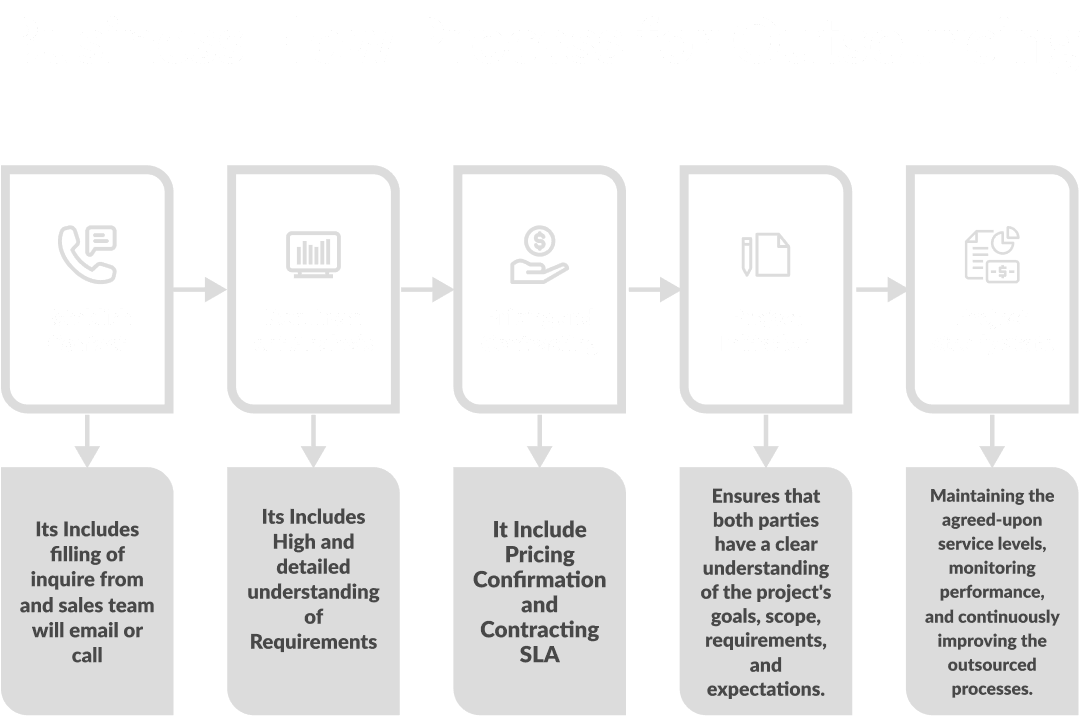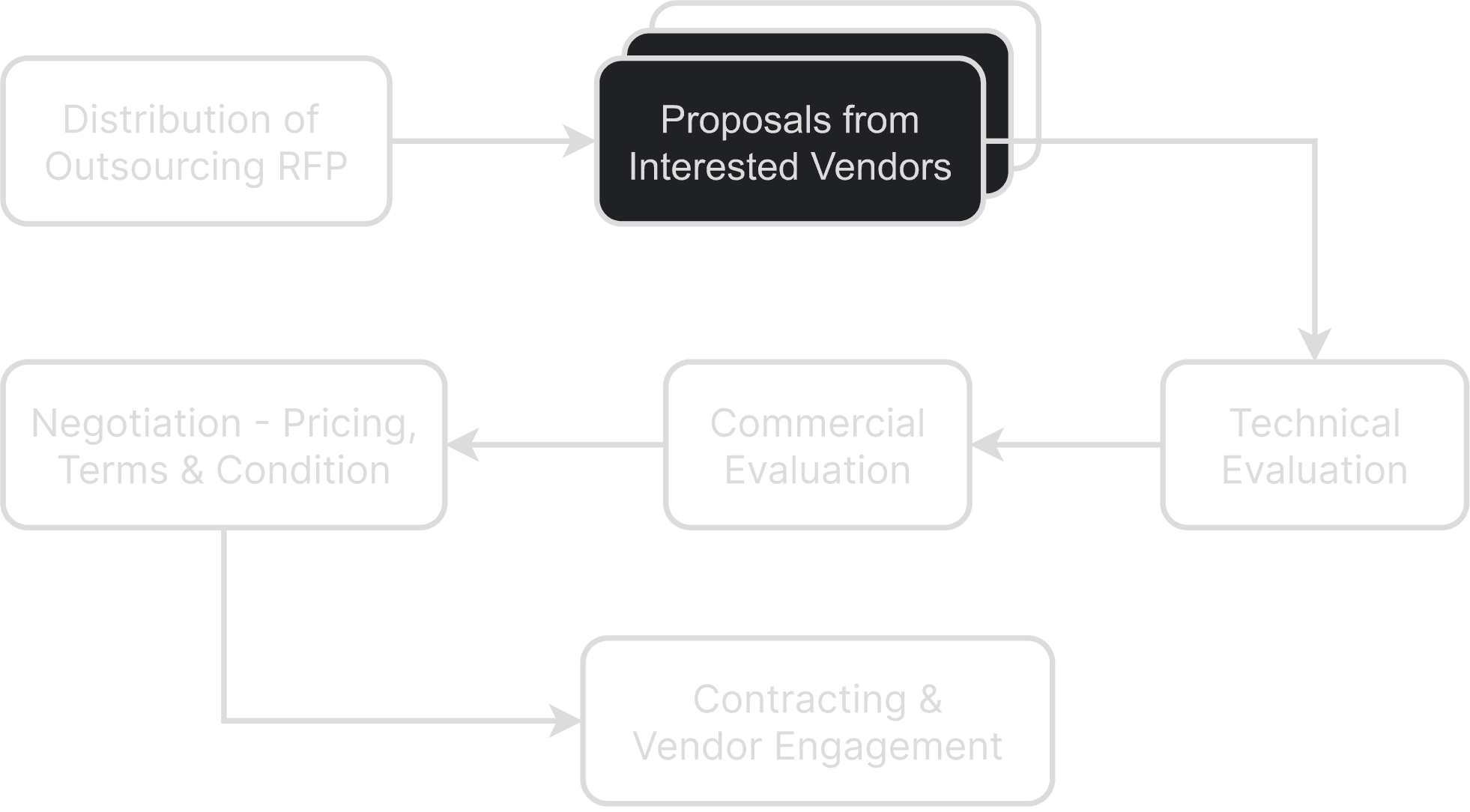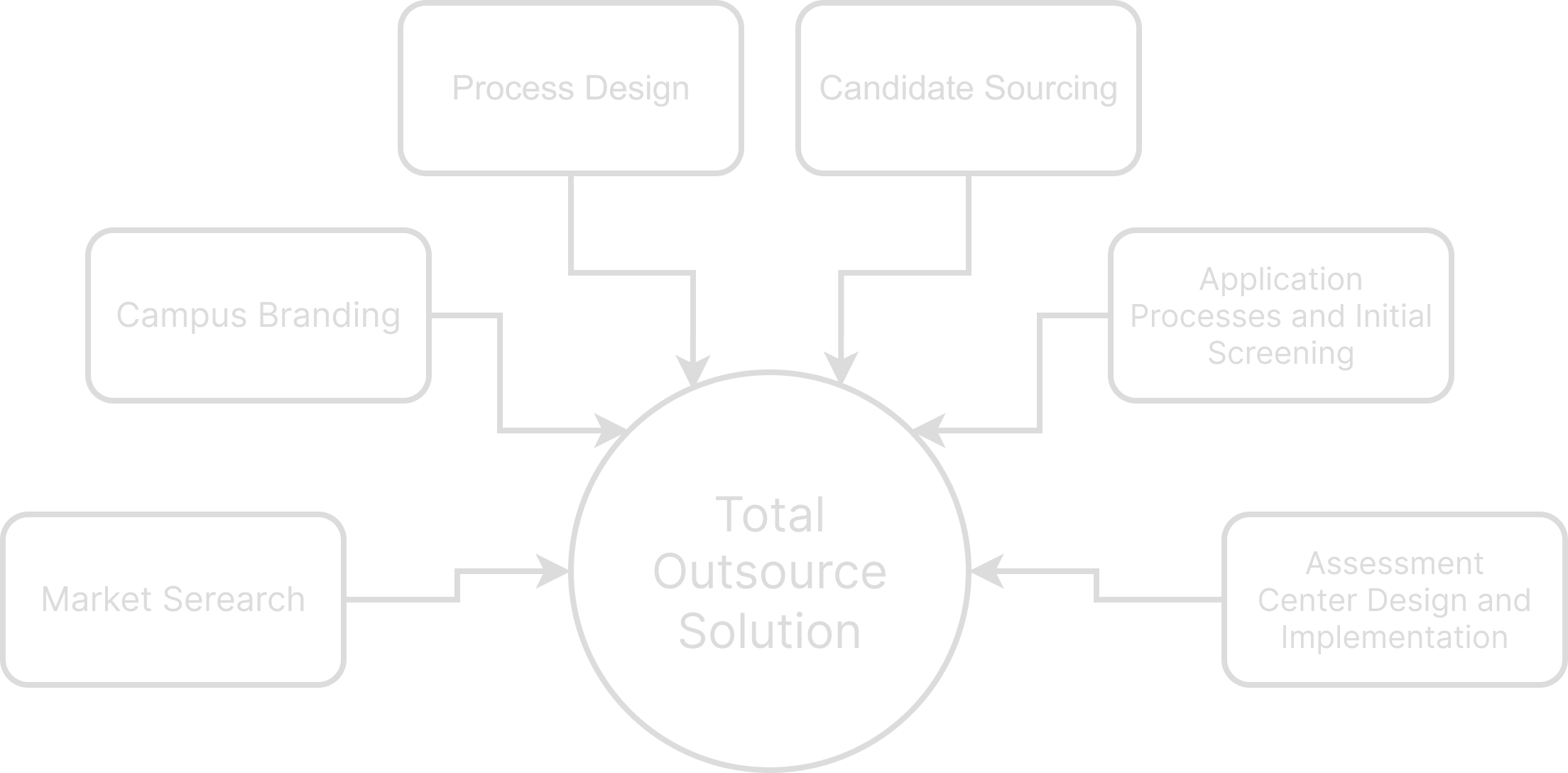2 years ago
Outsourcing
Introduction to Outsourcing: Exploring Benefits, Challenges, and Considerations
Outsourcing
Benefits
Challenges
Considerations
In today's highly competitive and dynamic business landscape, organizations are increasingly turning to outsourcing as a strategic approach to drive growth, enhance efficiency, and optimize resources.
Outsourcing involves the delegation of specific tasks, functions, or processes to external vendors or service providers. This article aims to provide an overview of outsourcing, its key benefits, challenges, and important considerations for businesses considering this business strategy.

Photo by Mike Chai: https://www.pexels.com/photo/time-lapse-photography-of-people-walking-on-pedestrian-lane-842339/
A Brief History
Outsourcing emerged as a strategic business approach in 1989 and subsequently gained widespread adoption during the 1990s, significantly impacting the field of business economics. However, the practice of outsourcing remains a topic of substantial debate and contention in numerous nations.
Detractors contend that it has resulted in the displacement of domestic employment, primarily within the manufacturing sector. On the other hand, proponents argue that outsourcing incentivizes businesses and organizations to allocate resources strategically, focusing on areas where they can achieve optimal effectiveness. Moreover, they assert that outsourcing plays a crucial role in preserving the fundamental principles of free-market economies on a global scale.
The Definition of Outsourcing
Outsourcing is a business strategy wherein an organization delegates specific tasks, functions, or processes to external service providers. It is a strategic arrangement aimed at optimizing resource allocation, improving operational efficiency, and reducing costs by entrusting non-core activities to specialized third-party entities.
In practice, outsourcing involves establishing long-term collaborations with external vendors who assume responsibility for previously internalized functions and operations. The primary objective of outsourcing is to gain a competitive advantage by accessing additional resources, enhancing service quality, minimizing operational expenses, and achieving greater flexibility in managing business needs.
Outsourcing can encompass a wide range of activities, including information technology services, customer support, finance and accounting, manufacturing, and marketing. In a global context, outsourcing often involves cross-border partnerships, where organizations choose to collaborate with service providers in other countries to leverage comparative advantages and optimize operational efficiency.
When considering outsourcing, organizations must take into account several important factors. These include strategically evaluating which activities are suitable for outsourcing, selecting reliable and experienced service providers, crafting comprehensive and clear contractual agreements, and effectively managing potential risks associated with outsourcing.

The Challenges
Outsourcing service, while offering numerous benefits, also presents several challenges that organizations need to navigate effectively. Some of the key challenges of outsourcing include:
Communication and Language Barriers: Outsourcing often involves working with service providers located in different countries or regions. Language barriers and differences in communication styles can pose challenges in effectively conveying requirements, expectations, and feedback. Miscommunication can lead to misunderstandings, delays, and quality issues.
Quality Control and Service Levels: Maintaining consistent quality control when outsourcing is crucial. It can be challenging to ensure that the service provider adheres to the desired quality standards, especially if there are differences in work cultures, processes, or standards between the client and the vendor. Establishing clear service level agreements (SLAs) and implementing effective monitoring mechanisms is essential to ensure the desired quality of work.
Data Security and Confidentiality: Outsourcing often involves sharing sensitive business data and information with external service providers. Protecting data security and ensuring confidentiality is paramount. Organizations need to establish robust security measures, implement data protection protocols, and conduct thorough due diligence on the service provider's security practices to mitigate the risk of data breaches or unauthorized access.
Successfully managing these challenges requires careful planning, robust communication, proactive risk management, and building strong partnerships with outsourcing providers. By addressing these challenges effectively, organizations can leverage the benefits of outsourcing while mitigating potential drawbacks.
The Difference in Company Before and After Utilizing Outsourcing
Outsourcing can provide several benefits to companies, enabling them to improve efficiency, reduce costs, and focus on core competencies.
For example, Company XYZ, a mid-sized software development firm, used to handle all aspects of their IT infrastructure and support in-house. This included managing servers, network maintenance, software updates, and helpdesk support.
However, they faced several challenges. Their IT team was stretched thin, struggling to keep up with increasing demands and maintain consistent service quality. The company's core software development projects were often delayed due to IT issues, resulting in missed deadlines and dissatisfied clients.
Additionally, the company's IT costs were escalating, including hiring and training IT professionals, investing in infrastructure, and keeping up with technology advancements.
Realizing the need for a more efficient and cost-effective solution, Company XYZ decided to outsource its IT operations to a reputable managed service provider (MSP). The MSP offered a comprehensive IT support package, including server management, network monitoring, software updates, and helpdesk services.

The impact of outsourcing was significant:
Improved Efficiency: With the MSP's specialized expertise, Company XYZ experienced improved IT efficiency. The MSP's proactive monitoring and maintenance practices minimized system downtime, ensuring smooth operations and minimizing disruptions. This enabled the company's internal teams to focus on core software development projects, resulting in faster project delivery and improved client satisfaction.
Cost Savings: By outsourcing, Company XYZ reduced its IT expenses significantly. Instead of investing in expensive infrastructure upgrades and hiring additional IT staff, they paid a fixed monthly fee to the MSP, which covered all IT support services. This predictable cost structure helped the company better manage its budget and allocate resources more effectively.
Access to Specialized Skills: The MSP brought in a team of experienced IT professionals with specialized skills in various areas of technology. Company XYZ gained access to a broader skill set, including expertise in emerging technologies and industry best practices. This enabled the company to leverage the latest technological advancements and stay competitive in the market.
Enhanced Scalability: Outsourcing provided Company XYZ with the flexibility to scale their IT operations based on their evolving needs. As the company grew, the MSP seamlessly adjusted its services and resources to accommodate the increased demands, ensuring that IT support aligned with business requirements.
And BTS.id Got You Covered
In today's fast-paced business world, staying ahead of the competition requires businesses to adapt and leverage strategic solutions. This is where BTS.id comes in, a leading technology company at the forefront of software development. With our exceptional expertise and commitment to excellence, BTS.id offers a game-changing service: outsourcing.
Imagine a scenario where your company faces increasing demands for software development, but your internal resources are stretched thin. This is where outsourcing becomes a valuable ally. By partnering with BTS.id for outsourcing, you unlock a world of possibilities.
Outsourcing with BTS.id empowers your company to tap into their vast pool of skilled professionals and technical expertise. You no longer have to worry about the time-consuming process of hiring, training, and managing an in-house team. Instead, you can focus on your core business functions, confident that your software development needs are in the hands of industry experts.

Photo by Startup Stock Photos: https://www.pexels.com/photo/two-women-sitting-in-front-of-computer-monitor-7374/
With BTS.id as your outsourcing partner, you gain access to a dedicated team that is committed to delivering high-quality software solutions tailored to your specific requirements. Their extensive experience and knowledge enable them to tackle complex projects efficiently and effectively. From software development and maintenance to quality assurance and support, BTS.id covers it all, ensuring smooth and seamless operations for your company.
Moreover, outsourcing with BTS.id provides cost-saving advantages. Rather than investing heavily in infrastructure, salaries, and ongoing training for an internal team, you pay for the services you need when you need them. This flexibility allows you to allocate your resources strategically, optimizing your budget while still receiving top-notch software development services.
Ready to unlock the full potential of your company? Embrace the power of outsourcing service with BTS.id and experience a new level of efficiency, expertise, and cost-effectiveness.
Contact BTS.id today and discover how outsourcing services can revolutionize your software development processes. Maximize your company's potential, streamline operations, and gain a competitive edge. Partner with BTS.id for exceptional outsourcing services that propel your business forward.
HIT US UP
BRIDGE TECHNOLOGY SERVICES
HIT US UP
BRIDGE TECHNOLOGY SERVICES

Your request has been sent, please wait for our reply
Outsourcing has became a common practice nowadays. As technology advances and businesses are constantly shifting to stay relevant and ahead of the competition, relying solely on your internal IT team is no longer an option.
In the previous article, we have talked about the outsourcing practice in general: The brief history; the types of outsourcing; and scrum, which is the common methodologies many outsourcing company use in delivering projects.
Read first: Outsourcing Developer: Why Indonesian Companies Should Consider it?
In this article, we will talk about something that you are probably looking right now: a Java Spring Developer.
But first, what is Java Spring?

If you are planning on developing your own enterprise application, a Java Spring Developer is what you should be looking for. Spring itself is a Java-based open source framework that provides comprehensive infrastructure for faster, easier, and more flexible application development.
First written by Rod Johnson in 2002, Spring has became the most popular frameworks of Java as an addition and even replacement of the EJB or Enterprise JavaBeans model.
Why Java Spring?
The Spring framework do what EJB was unable to do. Spring framework removes the complexities that entail the development of enterprise application using EJB. It allows developers to buid simple, reliable, and scalable enterprise applications. It main focus is to provide various ways to help you manage your business objects; and develop web applications with much easier manner as compared to classic Java frameworks.
In other words, it is an easier way to code application.
Spring is a modular framework with various components come as independent modules that give developers the flexibility to use only what is needed and leave the rest. Resulting in a cleaner, testable, and more structured code that makes the application lightweight and focused.
Spring framework is also multipurpose. Means it can be used for any infrastructure needs, not only web apps building, but also security, configuration, and big data. It can be deployed standalone, in an app server, on a Cloud, or all of the above at once.
Read also: Real-time Data Processing Architecture Part. 1.
Another advantage from Spring framework is its maturity, which means its capability to build enterprise applications that follows the industry standard is proven. Despite being first-released in 2002, Spring’s open source characteristic makes it still relevant in the business even today.
Hiring a Java Spring Developer

To implement Java Spring, you will need a Java Spring Developer. After all, Spring is hard and chances are your internal IT team is not familiar with the framework. Your developer will need around 2-3 years of working experience to fully comprehend it and capable enough to handle big projects.
However, hiring a permanent Java Spring Developer is not an easy task either, considering the effort, money, and time your company will have to spend, especially if your project is only few months long.
The best option is to hire a Java Spring Programmer from an outsourcing company. Not only it saves your time and cost, but outsourcing your Java Spring Developer will allow your internal IT team to focus on daily maintaining tasks. An outsourcing company will also provide you with professional programmers experienced in vast range of projects. More importantly, hiring from an outsourcing company means you can adjust the employment period to your project’s duration.
Read more: Outsourcing Your IT Support: Pros and Cons.
How to Hire Java Spring Developer from an Outsourcing Company
If you are looking for a great Java Spring Programmer with broad and extensive working experience, you can simply put in the request to our company and we will find the right candidate to work on your project immediately.
We will perform all the job for you.
Contact us:
Telp : (+62 22) 6614726
Email : info@bts.id
Outsourcing Developer – There is nothing more troublesome for a company than winning a project, but lack of resources to get it done.
Most of the time, recruiting new employees is not the answer, as its long process will waste your time–something that you don’t have plentifully when handling a project. The thing is, client will not likely to wait for you. Time will keep ticking and deadlines will keep approaching. You might be wondering, how is it possible to get the right, capable talents for your project in such a short notice?
Your best bet: try hiring experts from an outsourcing company.
It is fast, uncomplicated, and you can simply arrange the employment according to your company’s needs. While it can be very difficult to find available experts to hire, an outsourcing company will provide you with the most suitable candidate within weeks. It saves you from a lot of steps you have to take and costly expense you have to spend when recruiting in-house employees.
You won’t have to worry about high training cost either, as it has been taken care of by the outsourcing company.
Furthermore, a lot of outsourcing company are also offering businesses with the opportunity to increase their development capacity, and to share their workloads with a third-party so that their internal team can focus on the core business more. This was presumably the very reason why this practice began in the first place, although nowadays, a lot of companies decided to outsource merely to cut costs.
Brief History
Although outsourcing was not formally identified as business strategy until 1989 and became the integral part of business economics throughout the 1990s, the history of this practice can be traced back to the Industrial Revolution era where companies, to quote an article by NC state university, ‘have started to grapple with how they can exploit their competitive advantage to increase their market and profit.’
In 1950s and 1960s, as a result of diversification, companies began to expect more profit and, as the result, in around 1970s and 1980s, compete globally though being hindered by a lack of agility caused by bloated management structure. To tackle this situation, many large companies tried to increase their flexibility and creativity by developing a new strategy of focusing on their core business, a strategy that was later called as ‘outsourcing’.

What is Outsourcing?
Basically, it is called outsourcing when you, as a company, hires another company to be responsible for activities that are and could be done by your internal staff and resources.
It is a business practice and strategy in which an outsourcing company–usually known as the third-party–arrange their own worker to perform the tasks or services for another company, either on-site or remotely.
These days, you can get almost every support for your company’s IT needs through outsourcing. A lot of reliable outsourcing company will provide you with the most skillful talents with various skillsets that you can choose to meet the needed requirements. From back-end to front-ed developer, designer, and even the project manager, you are given the choice whether to employ a person, or a team.
On-Site Outsourcing
If you hire someone from an outsourcing company and they have to work from your office instead of their original company, it is called an on-site outsourcing. The differences between this and the regular recruitment for in-house employee are, obviously, the hiring process, and the employment system in which you can employ qualified experts for merely a short period–or, in this case, as long as the duration of your projects.
There’s no need to hire them permanently, nor be the one to responsible for their health insurance, which is not cheap, and incentive as the outsourcing company has covered it all.

Remote Outsourcing
With remote outsourcing, the employees that you hired stays at the outsourcing company’s office. They work for you, do every task you assign to them, but remotely. And no, it’s not similar to when outsource a project to a third-party company. The main difference lies in the project’s executor. When it’s the project that you outsource, you hire the whole company and anyone in the company might be doing it for you.
When you outsource the specific employee, you pick the personnel that fit your needs the best, and only those people will execute the tasks for you. You can still get the benefits of on-site outsourcing, but without the trouble of having to provide a space in your building. They won’t stay for a long time, anyway.
However, as much as this sounds more beneficial than the on-site one, it does come with challenges that can hinder your team’s performance if not managed properly. First challenge, communication. Since you and the employee you hired won’t be working from the same place, you will have to make extra effort just to communicate with each other. Second, for the same reason with the first one, it’s rather difficult to do supervision.
Third, while software development relies heavily on collaborative work, collaborating is also something that remote-working employee can’t do easily. To fix those problems, many experts has recommended companies to adopt scrum to manage their projects.
But What is Scrum, Anyway?
To give you summary, Scrum is one of iterative and incremental Agile software development methods where products can be delivered in a productive and creative manner with aim to achieve the highest possible value.
While Agile is the practice that employs incremental and iterative work beats called sprints, Scrum is more like the process. It is a framework that each member has to follow so that the team can achieve the same goals. With its 3 pillars, which are transparency, inspection, and adaptation; Scrum allows projects to be self-organized, and constantly examined to ensure that the process won’t deviate too far from the goal.
Scrum is usually conducted by a team comprises Product Owner, Development Team, and Scrum Master. There are 4 events in running a project managed by Scrum:

– Sprint Planning
A beginning of a Sprint when the entire Scrum Team are collaborating to plan the work that’s going to be performed during the Sprint. In this event, the Scrum Team discuss Product Backlog, the latest product Increment, projected capacity of the Development Team, and Sprint Goal that the team want to achieve at the end of the sprint.
– Daily Scrum
Daily event at which the Development Team plans work for the next 24 hours, inspect the work since the last daily scrum, and forecast upcoming Sprint work. The aim of this event is to optimize collaboration and performance of the Development Team.
– Sprint Review
An event that is held at the end of the sprint where the Scrum Team and stakeholders collaborate to inspect the Increment and adapt the Product Backlog if needed.
– Sprint Retrospective
Sprint Retrospective is an event where the Scrum Team got the opportunity to inspect itself and create a plan for improvements to be implemented during the next Sprint. It is usually conducted between the last Sprint Review and the next Sprint Planning.
A Sprint is a time period at which a ‘Done’, usable, and potentially released product Increment is created. While the Scrum framework itself isn’t exclusive to software development and outsourcing system in general, Scrum is probably the most well-known framework for agile software development, as software development is usually prone to uncertainty and bigger risk, thus going back to fix them would cost too much time and money.
In outsourcing, though, Scrum helps to improve team’s communication, coordinate work more efficiently, and gain responsibility of the product. When you outsource developers to work remotely, it usually technology that help you communicate with each other.
One of our clients, for example, has set a specific time of when they would contact the outsourced developers and conduct Daily Scrum through video call on Skype. Later at the end of the day, the developers would report the progress and what they have done that day to the PIC from the client-company, usually through project management and collaboration applications.
At BTS.id, we are committed to help companies expand their capacity by providing experienced talents with wide range of skillsets in software development. With mission to always give the best service to our clients, Bridge Technology Services (BTS.id) can be the solution to your business
Looking for talented developers to outsource? Contact us:
Phone : (+62 22) 6614726
Mail : info@bts.id
Jasa Outsourcing dan Segala Kelebihannya
Outsourcing atau alih daya sudah menjadi istilah umum dalam hukum perburuhan Indonesia. Istilah Outsourcing atau alih daya sendiri sebenarnya sudah umum digunakan, bahkan sudah diatur dalam Undang Undang Nomor 13 Tahun 2003 pasal 66. Secara umum istilah ini merujuk pada penggunaan tenaga kerja pihak ketiga untuk bagian tertentu dari pekerjaan perusahaan.

Tapi apa itu outsourcing?
Mengutip finansialku, Jumat (21/1/2022), alih daya atau jasa outsourcing adalah pengadaan jasa tenaga kerja yang dilakukan oleh sebuah perusahaan. Secara teknis, sebuah perusahaan menyediakan tenaga kerja dengan kompetensi tertentu untuk dipekerjakan di perusahaan lain.
Outsourcing atau alih daya pertama kali dikenal sebagai salah satu strategi bisnis pada tahun 1988 dan sepanjang tahun 1990 mulai menjadi bagian integral dari ekonomi bisnis. Seiring berkembangnya teknologi, banyak perusahaan yang mengubah beberapa aktivitas dan manajemennya menjadi berfokus pada mobile maupun internet untuk memperluas bisnisnya. Hal ini tentu membuat bisnis pemanfaatan jasa outsourcing pun juga semakin berkembang ke arah teknologi atau IT. Selain dapat menghemat waktu, namun juga IT outsourcing ini cocok untuk perusahaan yang mempunyai sedikit karyawan dan dana yang terbatas.
Saat ini sudah banyak perusahaan yang memakai layanan jasa outsourcing atau alih daya, bahkan di dunia IT terdapat jasa IT Outsourcing yang fokus menyediakan external IT resource sesuai dengan kebutuhan dari perusahaan. Dengan kata lain, IT outsourcing adalah praktik penggunaan sumber daya IT eksternal untuk mendukung kinerja suatu perusahaan.

Photo by Christina Morillo: https://www.pexels.com/photo/two-women-looking-at-the-code-at-laptop-1181263/
Layanan dari IT outsourcing tersebut, biasanya akan mencakup beberapa hal, seperti:
- pengembangan aplikasi/perangkat lunak
- pengembangan web/hosting
- IT Infrastruktur
- pengembangan database
- technical support
Jadi singkatnya, IT outsourcing atau alih daya adalah praktik pemanfaatan sumber daya IT eksternal untuk membantu berbagai aktivitas IT suatu perusahaan. IT outsourcing ini disebut juga sebagai penyedia tenaga kerja di bidang IT atau teknologi
Jenis IT Outsourcing
Secara umum, IT outsourcing ini terbagi menjadi beberapa jenis, yakni:

A. Total outsourcing
Jenis outsourcing atau alih daya ini mengharuskan perusahaan untuk menyerahkan seluruh tugas dan pekerjaan yang berhubungan dengan IT ke pihak penyedia jasa atau pihak ketiga. Mulai dari hardware, software, hingga brainware.Total Insourcing
Jenis total insourcing lebih berfokus pada penyewaan tenaga ahli yang dimiliki oleh penyedia jasa IT outsourcing kepada perusahaan yang membutuhkan atau pihak penyewa.

B. Selective Sourcing
Khusus jenis ini perusahaan dapat memilih sendiri fasilitas IT yang akan diserahkan atau dikelola oleh pihak penyedia layanan IT outsourcing. Misalnya perusahaan ingin membuat aplikasi pembukuan sebagai produk terbaru mereka, maka perusahaan bisa meminta bantuan jasa IT outsourcing untuk membuat dan mengembangkan aplikasi tersebut.

Photo by Startup Stock Photos: https://www.pexels.com/photo/two-women-sitting-in-front-of-computer-monitor-7374/
C. De Facto Insourcing
Pada jenis de facto insourcing pihak penyewa mengalihkan semua hal mengenai masalah IT ke pihak penyedia layanan atas faktor kemitraan yang telah dibangun sebelumnya. Misalnya ketika di awal merintis bisnis kamu pernah menyewa jasa IT sourcing untuk membantu mengembangkan aplikasi. Kemudian saat ini kamu menyerahkan kembali urusan IT perusahaan lainnya kepada IT outsourcing yang sama untuk dikelola dengan baik.
Beberapa contoh IT outsourcing
Berikut adalah beberapa contoh layanan IT outsourcing yang sering digunakan oleh perusahaan:
1. E-Outsourcing
2. Penyedia layanan aplikasi (ASP)
3. Cloud computing
Permasalahan IT dalam perusahaan memang tidak bisa dihindari dan oleh karena itu, perusahaan haruslah memiliki perencanaan terbaik untuk melindungi aset berharga tersebut. PT. Intersolusi Teknologi Asia ( BTS.id ) siap melayani Anda untuk mengenal lebih dekat layanan IT outsourcing yang dapat diberikan kepada Anda sesuai dengan kebutuhan perusahaan.

Kelebihan Pemanfaatan Jasa Outsourcing
IT outsourcing mempunyai banyak keuntungan dan kelebihan dan manfaat bagi perusahaan yang membutuhkannya. Berikut adalah beberapa kelebihan dari pemanfaatan IT outsourcing:
1. Lebih Menghemat Waktu dan Biaya
Keuntungan pertama yang didapat dengan pemanfaatan jasa outsourcing atau IT outsourcing adalah perusahaan dapat menghemat biaya operasional. Mulai dari biaya perawatan, waktu, rekrutmen, dan sumber daya manusia.
Biaya perawatan IT perusahaan tentu sangat besar, apalagi jika jumlah dan beban perangkat yang digunakan begitu banyak dan tinggi. Namun, dengan pemanfaatan jasa IT outsourcing perusahaan tidak perlu mengkhawatirkan masalah tersebut. Sebab, semuanya akan langsung ditangani dengan baik dalam satu paket layanan yang ditawarkan oleh pihak penyedia jasa.
2. Lebih Fokus pada Bisnis
Keuntungan kedua yang bisa dirasakan oleh perusahaan dalam pemanfaatan jasa outsourcing khususnya IT outsourcing adalah mereka dapat lebih fokus pada bisnis itu sendiri. Sebab, segala urusan IT akan ditangani oleh tenaga ahli yang profesional dan berpengalaman dari pihak jasa IT outsourcing.
Perusahaan pun tidak perlu lagi berfokus untuk pekerjaan yang tidak ada hubungannya dengan bisnis utamanya. Tidak hanya itu saja, perusahaan juga bisa mengalihdayakan pekerjaan sehari-hari bidang IT kepada penyedia layanan agar staff IT, perusahaan dapat fokus mengerjakan tugas khusus yang berdampak langsung pada pendapatan.
3. Mempercepat Go-To-Market ( GTM )
Keuntungan berikutnya adalah bagi perusahaan yang menggunakan strategi marketing omnichannel mengutamakan kecepatan taktik untuk memenuhi kebutuhan konsumen. Misalnya perubahan fitur, penambahan platform teknologi seperti website, dan kemudahan akses pada aplikasi. Hal ini tentu tidak bisa dilakukan sendiri oleh tim IT internal saja, sehingga membuat perusahaan menggunakan jasa outsourcing khususnya IT outsourcing untuk membantu mengelola berbagai hal yang berhubungan dengan aktivitas bisnis dan pemasaran perusahaan dapat cepat tertangani. Dengan begitu, staf internal dapat lebih fokus untuk memikirkan strategi yang akan dilakukan selanjutnya.
4. Memiliki SDM yang Expert
Keuntungan lain yang bisa didapat terutama bagi perusahaan yang tidak memiliki anggaran atau sumber daya yang memadai untuk mengelola sistem dan layanan IT yang dibutuhkan. Penyedia jasa outsourcing memiliki banyak portofolio dan memiliki sumber daya yang terpercaya, sehingga perusahaan dapat memanfaatkan layanan tersebut untuk mengembangkan bisnisnya. Perusahaan dapat memanfaatkan sepenuhnya layanan yang ditawarkan IT outsourcing untuk membantu mempercepat perkembangan perusahaan.
5. Mengurangi Resiko
Keuntungan berikutnya dari pemanfaatan jasa outsourcing khususnya IT outsourcing adalah dapat mengurangi resiko ketidakpastian bisnis di masa depan. Sebab, bisnis yang tidak pasti akan berdampak pada kesejahteraan karyawan sehingga berpotensi pada pemutusan hubungan kerja. Pemakaian jasa outsourcing ini sangat cocok untuk startup dan bisnis yang baru dirintis atau berskala kecil. Tujuannya tentu untuk mengurangi resiko kebangkrutan dan kerugian bisnis.
6. Fleksibilitas dan Skalabilitas
Keuntungan berikutnya adalah jika teknologi informasi mengalami perubahan yang sangat cepat dan tidak mudah untuk diprediksi. Maka dari itu, perusahaan harus bisa cepat beradaptasi pada setiap perubahan jika ingin memperoleh layanan yang lebih baik. Dengan pemanfaatan jasa outsourcing khususnya IT outsourcing, perusahaan akan lebih mudah mengikuti perubahan. Sebab, tenaga ahli dari IT outsourcing biasanya dapat menyesuaikan tren yang sedang terjadi.
Namun, penting untuk diingat bahwa pemanfaatan jasa outsourcing atau alih daya juga memiliki tantangan dan risiko yang harus dikelola dengan baik. Oleh karena itu, penting untuk melakukan evaluasi yang cermat sebelum memutuskan untuk mengoutsourcing pekerjaan IT dan memilih mitra yang tepat untuk memastikan bahwa manfaatnya sesuai dengan kebutuhan dan tujuan bisnis perusahaan.
Sebagai perusahaan penyedia solusi berbasis teknologi PT. Intersolusi Teknologi Asia ( BTS.id ) hadir untuk Anda dalam memberikan solusi untuk jasa IT outsourcing berpengalaman yang dapat membantu Anda. PT. Intersolusi Teknologi Asia ( BTS.id ) siap menyediakan layanan IT outsourcing yang mampu memenuhi kebutuhan akan tenaga kerja ahli untuk proyek IT Anda.
Jika Anda memiliki pertanyaan jasa outsorcing khususnya IT outsourcing untuk perusahaan Anda, jangan ragu untuk menghubungi kami BTS.id.
Sampai sini dulu perjumpaan kita, semoga bermanfaat
IT outsourcing along with its benefits and disadvantages has been playing an important role in today’s tech culture. When it comes to strengthening or fulfilling business needs from an IT department point of view, there are always options; some may say to build an IT department from scratch, and the rest go and hire IT outsourcing. Budget, time, and resources may very well be the most important considerations.
However, it gets complicated when every consideration is intertwined with one another resulting in extravagant metrics that involve too many stakeholders. This would take too much time and delay any strategic move since tech and IT culture goes at a fast and dynamic rate.
To narrow things down, here are some signs which indicate whether or not you need to hire IT outsourcing. Read on!
IT Happens to Be Outside Core Competencies
Using the service of IT outsourcing should be one of the first considerations when IT is not of the core competencies of the organization. Implementing services that save expenses, increase flexibility, and allow you to remain relevant in a dynamic environment can be an invaluable asset as you remain focused on more core competencies.

This kind of operation is typically required due to a lack of in-house knowledge and development resources. When there is a tight deadline and no internal talent is capable, the situation becomes more frustrating.
Skill Gap in IT Department
Companies cannot always afford to recruit highly qualified professionals. As a result, there will be a talent deficit when it comes to developing specialized disruptive projects. You may scale up by outsourcing IT developers and expanding your expert resource pool. As a result, the skills gap is filled with specialist technical knowledge, assuring a quality output.
One of the most underestimated aspects of IT outsourcing is that it is provided by an outside organization, which also gives you outside knowledge. Therefore, not only does it fulfill your business needs, but IT outsourcing also can be beneficial for the development of your existing IT department.
High Turnover Rate in IT Department
IT talents are in great demand in recent years, and you may not always be able to satisfy their wage expectations. This might result in a high turnover rate in your IT department. One practical solution is to hire IT outsourcing to take on activities until your company is lucrative enough to comfortably hire full-time, dedicated personnel.

The Needs to Strengthen Security System
If you reckon your company is not adequately prepared for a cyberattack, using IT outsourcing can make a significant impact. An IT outsourcing service provider will often have the most up-to-date technology and know-how to give security solutions that are ideal for your company.
IT organizations may also incorporate cutting-edge technology, such as AI and self-learning, into your IT system, allowing your security system to create safeguards automatically.
IT Operations Hold You Back
If you are having difficulty managing, employing, or sustaining your IT operations, it is a strong indicator that you should consider outsourcing them. Companies should concentrate on building their business rather than on their IT operations cost center, which should be outsourced to a partner.

Companies may benefit from outsourcing models in a variety of ways, including reduced costs, faster time to market, scalability, regional flexibility, and higher quality products. The IT outsourcing model may also assist firms in having dedicated IT workers who are experts in the newest and rarest technologies and have the requisite expertise to effectively implement projects.
Looking for IT Outsourcing providers that can help you gap the bridge between technology and business? Look no further! Contact us!
As we have been covering the background, benefits, and even technicality of IT outsourcing, there is one important thing that we must not miss; keeping balance between the outsourcing and remaining team in the company. This is one of the most important keys in generating seamless flow in managing and developing your product with high performance with the combination of outsourcing talents and remaining team.
IT Outsourcing is a strategy that will take you to great success only when you do it right.
Now the question is, how to do that? Here are some tips for you to follow to ensure a successful experience in IT outsourcing!
Well-Defined Objectives are Essential
Determine what aspects of your business need outsourcing forces and how the vendor finds the solution. By doing this in the first place, both parties can set the expectations and ensure that the service used will align with the desired result.

Build a Robust Foundation Within the Management Relationships
The relationship between a company and its outsourcing provider determines how successful their partnership is. A positive working relationship with your provider can be a firm foundation for long-term growth and trust.
Ensure Data Security and Compliance with Regulatory Requirements
Your customer data security should be your top priority, especially when third parties are involved. Please make sure you review all regulatory and data security requirements, then find a vendor that can comply with those standards. To minimize the risk of a data breach, failure in complying with applicable laws and regulations will result in extortionate fines and harm your reputation.

Improve Conflict Management Processes
Be aware of the possibility of a conflict, especially when you work with different people. You need to effectively resolve disputes as it is critical to improving team relationships and overall performance.
To overcome any conflict possibilities, you should create a conflict management process that both parties must follow. Ensure that these processes involve a logical hierarchy of escalation and negotiation for better representation and prioritization.
Communicate Clearly and Frequently
Communication is one of the key factors for successful outsourcing. Clarity is not enough. You also need to communicate frequently to avoid miscommunication. By doing clear and frequent communication, you will minimize errors and assure delivery, milestones, and other requirements are met. Moreover, urgent projects require intense coordination to make sure prompt delivery.

These five steps will help you to optimize your IT outsourcing strategy. Have you ensured every point of discussed best practice?
We are open to analyzing and mapping out business requirements for the best result. Fancy a collaboration before digging deeper to bridge the gap between business and technology? Contact us!
As per our discussion regarding IT outsourcing in previous articles, outsourcing is a strategy that helps any company to work with IT experts but at the same time, they have more room to focus on business growth. The type of IT service may determine the right model, however as outsourcing services have expanded into more varied partnerships, the techniques and models have changed to incorporate managed services and more outcome-based agreements. IT outsourcing pricing and models play major role in the entire projects and output. Read on!
Fixed Pricing
As the term states, fixed pricing means that all the pricing is determined from the start of the agreement. If your company has stable and clear requirements, objectives, and scopes, the fixed pricing model most likely suits you perfectly. The situation allows you to predict the cost, making it easier to determine the deal price from the start by both parties.

Variable Pricing
This model allows you to pay a fixed pricing with variance as add-ons to certain services which may be excluded from the list of service items. In other words, this model is a fixed pricing model with extra, flexible requests from the clients. This model allows for some variances in IT outsourcing pricing based on providing higher levels of services from the provider.
Time and Materials
This model allows you to pay the provider based on the time and materials used to complete the work. If your company is in situations that are difficult to estimate or need to evolve rapidly, this model of IT outsourcing pricing might be a perfect choice. ‘Time and Materials’ model have been familiar to many clients and is usually used in long-term application development and maintenance contracts.
Cost Plus
This model of IT outsourcing pricing requires a contract that is written from the start so that you pay the provider for their actual costs and a predetermined percentage for profit.

Gain-Sharing
This IT outsourcing pricing is based on the value delivered by the provider beyond their typical responsibilities but gaining from their expertise and contribution. Both parties, the client and the provider, have money at risk and stand to gain a percentage of profits if the supplier’s performance is optimum and meets the client’s objective.
Unit/On-Demand Pricing
This model allows the provider to determine a set rate for a particular level of service. Then, the client pays based on its usage of the service. This pricing model is effective if your company needs to increase its productivity. This model also helps you to make component cost analysis and adjustments easy.
Performance-Based Pricing
This method is usually used in conjunction with a traditional pricing method, such as time-and-materials or fixed price. Performance-based pricing is a method when you provide financial incentives that encourage the provider to perform optimally.

Shared Risk or Reward
This method requires a more extensive level of governance to do well. Through this method, both parties jointly fund the development of the products, solutions, and services with the provider sharing in rewards for a certain period.
The different pricing models are significant according to the company’s different needs which also determine the relationship between the outsourced operations. This would enable companies and outsourcing service providers to go with what is best for each other. Note that determining pricing models is one of the most important steps before using IT outsourcing.
Looking for IT Outsourcing providers that can help you bridge the gap between technology and business for digital transformation optimization? Let us discuss how pricing models benefit us all! Contact us!
In 2022 we have started to adapt to the not-so-new-normal situation. It’s been two years since the pandemic hit the rest of the world, and it pushed us to do things differently leading to new technology trends. The conventional way has shifted into the digital habit, and that only means that the need for sustainability, ever-rising data volumes, and intensifying compute and network speeds will begin to set their status as the most significant parts of digital transformation.
This new way of doing things that rely on the digital sphere creates the trends that are likely to focus around how different technology intersect, serving us as tools that give us remarkable assistance in our day-to-day life!
Artificial Intelligence is Getting More Popular
About five years ago, when 1,500 senior business leaders in the US in 2017 were asked about AI, only about 17% said they were familiar with it. [1] Now, we can see & even experience it in every corner of our life!

AI is no longer being used only in the technology sector. It has grown so much, showing significant deployments in many other sectors: financing, security, health care, transportation, smart cities, you name it. It even has touched our personal life. Many of our homes are now armed with AI, making it what we knew as a smart home.
When it comes to business, it transforms the way we do it as we see more and more robotic process automation in admins, logistics, accounting, and HR departments. It’s not only popular but also can be found everywhere. As we have seen self-driving and self-parking cars developed and released by Tesla, it proves that AI has been already with us and ready to develop more subtly into our day-to-day activities. For a more vivid example, AI has been literally in our hands in the form of voice assistants like Apple’s Siri, Google Assistant, and Amazon’s Alexa.
These examples show us that AI technology implementation is not near. It is here.
The Rising of Digitization, Datafication, and Virtualization
Although remote working has been around for more than a decade, it has arrived at its peak during the covid19 pandemic. Working remotely, especially during the pandemic period, involves the virtualization of our workplaces.
Digitization is a process of converting analog format into digital which initiates the trend of datafication and virtualization. These trends help build the next generation of digital environments which allow people and businesses to top off their game.
We are used to using many tools that help us work and collaborate with our team from afar, be it slack, zoom, or even discord. However, what’s coming next is more advanced than what we have now!

You have heard about metaverse, persistent digital worlds that exist in parallel with the physical world. The most recent metaverse is the one that was proposed by Mark Zuckerberg, Meta. This would make physical distance irrelevant to being productive.
How significant will it change our life? Well, imagine you are working from home but still able to meet your colleagues in real-time, signing digitized documents, and hanging out with people around the world virtually.
The Emphasis on Transparency
In today’s environment, discussion about technology always involves the topic of transparency. Technology can’t work if we can’t trust it. That is why, also for other obvious reasons, transparency plays a vital role.
However, whenever there is technology innovation, there are often strong push backs against it as it is in many instances seen as conspicuous, dangerous, and irresponsible. Moreover, when we talk specifically about AI, it is often portrayed as a mystery in the sense that we can’t see inside it to understand how it works. This causes a perception when it could be possibly damaging.

The idea of transparent and clear AI has been increasing in recognition over recent years, as it has become clear that there are segments of society that distrust it for obvious (and good) reasons!
These trends would definitely take us to the next level of technology evolution. And evolution happens everyday, entering our way of processing day-to-day lives. Technology often goes without warning. As we blink, boom it happens. And we can’t deny the fact that these technology trends are high-performing cycles and require high-level knowledge and skills.
Finding high-level talents may not be the problem but acquiring one is. To perform high-level work in tech may cost you an arm and a leg especially if you plan to employ the talents. That’s when IT outsourcing comes! Not only it gives you the opportunity to realize today’s technology trends through experienced outsourcing talents and services but also it comes with many benefits including financial and organizational efficiency. Read about IT outsourcing benefits here.
Looking for IT Outsourcing providers that can help you introduce futuristic technology and bridge the gap to your business? Look no further! Contact us!
IT outsourcing has become an inextricable part of the business cycle. Offloading non-core operations to lower-cost experienced experts may be a viable and appealing possibility as companies seek more rational and efficient methods of functioning. Before digging deeper, you may have to know about IT outsourcing phases to minimize the risk.
The following are IT Outsourcing Phases you should be aware of before jumping into the decision before offloading your parts of IT function to an IT outsourcing service provider. Read on!
Phase 1: Assessment
The overall goal of this phase is to determine whether outsourcing is a viable option and what the likely size and shape of the deal will be. When it comes to critical issues like overall deal scope, location, and sourcing strategies, this perspective must be supplemented with a mature understanding of the strategies to be used.

The Assess phase ensures that due consideration is given to all key aspects of the outsourcing lifecycle, particularly with regard to:
The Assessment phase makes sure that all important components of the outsourced life cycle are taken into account. These assessments of IT outsourcing phases encompass:
- The financial benefits provided by outsourcing deal
- The liability and risk that must be avoided in order to achieve a feasible outcome
- The deal’s overall size and shape, as well as whether or not it meets business needs
- The amount of change that both business and IT functions must undergo in order for outsourcing to be successful for the duration of the contract.
Once the initial business drivers are understood, a high-level business case has been agreed upon, and the decision to go forward with an outsourcing initiative has been made, it is tempting to rush straight into the creation of the Request For Proposal (RFP) and the design of the ‘to be’ structures
It might look very appealing to jump right into the release for the Request For Proposal (RFP) and the design of the ‘to be’ structures once the initial business drivers have been understood, a high-level business case has been agreed upon, and the decision to move forward with an outsourcing initiative has been made.
Phase 2: Preparation
This phase’s main objective is to start initiating the plan which has been defined to the point when companies have chosen possible outsourcing service providers and issued a request for proposals. The outsourcing service providers are assessed in the market, and a Request for Proposal (RFP) is created and issued. All services in scope of the procurement become carefully defined during the RFP generation process, are signed off on by key client stakeholders, and are well described within the bidding documents.

This phase of the outsourcing lifecycle is very significant since it kicks off the first official engagement with the outsourcing service providers and outlines the client’s precise process requirements. A lot of criteria are used in a lengthy list of suppliers in order to cut it down to a shortlist. This is determined by the outsourcing service provider’s capacity to satisfy the client’s needs, which may be based on the results of a Request for Information (RFI) procedure. In the meantime, the company prepares a high-level commercial and financial framework for the deal defining key indicators of success or failure.
Phase 3: Appraisal
This phase aims to maintain feedback flow with the IT outsourcing service providers while they are reviewing their responses, and then negotiating with the vendors to reduce the number of short-listed providers to one or more.
The method used to complete the Appraisal phase will differ depending on the scope, value, and complexity of the services being procured, and the number of supporting resources required may range from a large dedicated evaluation and negotiation team to a small part-time team running a reverse bidding.
Regardless of the type of the outsourcing agreement, the focus should be on objective decision-making that leads to the short-listing of one or more IT outsourcing service providers which are best suited to provide the service completing the last piece of the puzzle.
Phase 4: Execution
The primary objective of this phase is to get the deal ‘across the line’. Many of the activities that were the main goal of this phase is to complete the contract ‘over the line.’ During the execution phase, many of the tasks started in the preceding phases should be completed.

Conclusion
It is important to go through each of IT outsourcing phases before appointing an IT Outsourcing service provider to minimize the risk of choosing the wrong and not suitable one which may be costly for both finance and timeline. The first phase, assessment, can help companies narrow down the option of providers which are perfect to consider the benefits and the cost. The second phase, preparation, is where the plan is designed and the objectives are set. The third phase, appraisal, is the decision making process in which determine whether or not the project starts. And the fourth phase, execution, is where it all kicks off.
Looking for IT Outsourcing providers that can help you optimize your business with the latest technologies? Look no further! Contact us!
When it comes to benefits of IT outsourcing, it shares some similarities with Business process outsourcing (BPO) in terms of benefits and functionalities. BPO is the delegation of one or more IT-intensive business processes to an external provider that, in turn, owns, administers and manages the selected processes based on defined and measurable performance metrics.
Business Process Outsourcing (BPO) / Business Process Management (BPM) is an activity to outsource part of the company’s business processes to third parties with the aim of cost efficiency and reducing risk to the company so that the company can focus more on its core business.
One of the most well-known advantages of using IT outsourcing services is that one company can reduce its hiring cost. Moreover, IT Outsourcing has got many more benefits up its sleeve! Here are seven advantages of outsourcing IT for your company you may want to consider. Read on!
Less Downtime
When it comes to efficiency, IT outsourcing is one of the most comfortable options for your company. When you hire an in-house IT manager that is responsible for your company’s IT, there are several things you have to deal with, namely: business hours, vacation, workload, and sick days. In contrast to in-house, IT outsourcing allows companies to handle 24/7 crisis support. In short, your IT can have as little downtime as possible.

Advanced Security System
Outsourcing allows the company to have supplementary security services like data monitoring, protection, and backup. Providers can supervise and check on unusual network activity, maintain updates to essential software like antivirus, and maintain good practices for cybersecurity. This is one of the benefits of IT outsourcing. We all know that not all companies have the capital to take a stake in cybersecurity infrastructure. The absence of cybersecurity infrastructure could lead to potential disruption of your IT system that will lead to more downtime and create more problems.
Instant Team Buildup
Having new staff in your company comes with challenges, especially with time and cost. If you are about to scale up your team, you could start to consider outsourcing IT as it allows you to have experienced IT experts in your company. The experts can be integrated with projects and critical tasks in no time. Moreover, it is easier to add and reduce staff numbers. This flexibility allows exceptional control over project management without the mandatory dedicated time to hire and train new employees.

Leverage In-House Team Potential
Outsourcing IT is one of the most effective ways to improve your team’s expertise by freeing up their time to focus on the most critical IT components of your company. This especially will work on any medium-to-large-size company with in-house IT experts. For example, an in-house can focus on advancing your technology or handling issues that need internal troubleshooting. They don’t have to spend their time monitoring, backup, doing software setup, basic support, and other time-consuming tasks as those parts can be handled by an outsourced IT team.
Cost Reduction
As mentioned earlier, cost reduction is one of the most common benefits that IT outsourcing can offer. Outsourcing converts fixed IT costs into variable costs and allows you to budget more effectively. You do not have to spend your budget to train new staff as IT outsourcing providers have already-prepared experts in IT with specific qualifications and expertise. In short, there is less capital required.

IT outsourcing comes with many benefits and challenges. However, with the right strategy, IT outsourcing will take you far. One of the most crucial things of the IT outsourcing strategy is to find the right provider!
In search of the perfect IT outsourcing company that would provide you with the best IT talents and solutions to help you complete your projects effectively and efficiently? Look no further!
Contact Us:
Email: info@bts.id
What is IT Outsourcing?
You might have heard about IT outsourcing, or in fact, are looking for more in-depth information on how it works and whether it could work for your company or not. Here is a short introduction to IT Outsourcing, followed by its primary objectives.
So, what is IT outsourcing? In short, outsourcing itself is the contracting of a third party to manage a business process more effectively and efficiently than can be done in-house. IT outsourcing is a specific type of outsourcing where you are able to reduce the cost of hiring a professional IT talent or even an IT team for your company.

There are probably good deals with outsourcing companies in Indonesia. However, before you decide to hire one, you should never underestimate the risk that comes with outsourcing if it is not done properly. Otherwise, it can be a great success if it is done rightly, follows due process, and proceeds with realistic expectations and a clear understanding of where the benefits are likely to emerge.
Primary Objectives
As Mark Kobayashi-Hillary in his book, Outsourcing to India, states that there are several objectives when it comes to IT outsourcing. The six of them are:
- Focus on Core Competencies
There are common cases where companies are not using their talented people optimally because they are focused on their day-to-day tasks and processes that are not strategic. That is where outsourcing can help the company to fill the necessity by being focused on performing their core competencies.
- Quality of Service
IT outsourcing companies strive to do the best they can do for their clients. Quoting Kobayashi-Hillary in his book that, “They have the infrastructure in place to offer a high-quality service that can even be measured using global standards such as ISO and CMM.”
- Recruiting the Best
It is no secret that many companies are struggling to find the best talents. When it comes to tech, the struggle gets more specific. Technology skills are something that has to be nurtured over time, as it revolves rapidly every year. That being said, companies have to provide their in-house engineers with proper training periodically, and sometimes, because of many factors, it is not possible to do. It provides a solution for this issue. They will constantly be training their people so you only get the best representative to assist your needs and complete your projects. They too are capable of offering you engineers with certified skills in any discipline you care to name.

- Better Technology
Kobayashi-Hillary himself stated that “An outsourcing vendor can afford to invest in better systems, networks and other technical services because the cost will be spread across various clients. Every client will benefit from the use of the latest computer hardware or call center technology, without the need to invest millions in purchasing the premises and equipment this would require.”
- Wider Skills Pool
As stated in point three, that service provider will constantly be training their people and can offer you, engineers, with certified skills in any discipline you care to name. When working with IT outsourcing providers, you can be guaranteed the latest skills are always available. It offers versatility to different needs of projects or products.

- Agility
Outsourcing allows the company from the capital charge of office space and equipment. Through outsourcing, companies are able to hire talent or even a team whenever a service needs to be quickly done to meet demand and then released to the vendor as the project goes into decline. This allows a level of flexibility that is impossible to achieve with in-house services.
In search of the right IT outsourcing company that would provide you with the best IT talents to help you complete your projects effectively? Look no further!
Contact Us:
Email: info@bts.id
Outsourcing of a range of business functions has became a common practice for enterprises across the world. From IT and communication to medical and health services, insurance, finance, and law; there are various reasons that a underpin company’s decision to choose outsourcing over hiring internal staff. First began in 1980s, outsourcing practice in IT (information technology) sector has continued to dominate the services-sourcing industry. As technology advances, more and more companies started to realize the advantage technology brings to the business.
For larger companies, it is often make sense to have their own IT team. However, for smaller companies with less resources, it will be more reasonable to outsourcing their IT force rather than hiring the whole team. Even so, outsourcing is not a practice that should be defined by the size of client’s company. It’s the company’s needs that should be taken into consideration.
Read First: Outsourcing Developer: Why Indonesian Companies Should Consider It?
In previous article, we have learnt about the outsourcing practice in general. Now, let’s take a look at the advantages and disadvantages of this practive.
IT Outsourcing: The Advantages
Knowing the benefits outsourcing could give to your business will help you decide whether this is something that will work for you. By outsourcing your talents, it will:

1. Reduce your expense
The main and initial reason people are began to practice outsourcing is because it basically saves money. Instead of bringing on more in-house staffs at a fixed cost, employing contracted workers means you don’t have the responsibilities to pay recruitment cost, full-time salary, investing in training, deal with vacations, bonus, and other employee benefits such as insurance or sick pay, as everything is already covered by the outsourcing company.
You can also hire the talents on a project-basis, that will give you the benefit of paying the contractors only for the work completed. Outsourcing allows you to find the right talent at the right price.
2. Give you ability to focus on core competencies
If IT is not your main product or service, outsourcing your IT function will free up your internal resources and allow them to focus on the core internal function. Especially if you are a small or medium-sized enterprise without excessive resources, shifting your IT load to a third party will give your staffs the opportunity to focus on their own specialism, and contribute in making the company an expert in delivering its core product.

3. Provide you access to larger pool of talents and specialists
Outsourcing practice especially the offshoring one allows enterprises the access to a wider pool of talents and specialists. When hiring in-house staffs, your choice is limited to a small, local talent pool and you would oftentimes have to compromise.
Even so, unless you hire an entire team of IT experts in different specializations, you may have to depend on the expertise of some in-house individuals, who will most likely become overworked. Outsourcing service providers often have a team of dedicated and experienced talents best suited for each job at hand that you can pick to suit your specific project requirements.
4. Give you competitive advantage
Outsourcing companies are often focus on providing services within very specific areas of a field. In IT field, this means that they will likely to have the latest equipment and current technology to handle your projects. By outsourcing your IT function, you can access those technology and knowledge without having to invest a big sum of money. This will put your business at a competitive advantage to rival larger competitors.
5. Flexibility to allocate your talents
Each project you conduct may require different technology and specialists. Outsourcing your IT allows you to divide projects across a group of specific experts and optimize resource utilization. Staffing flexibility means scalable IT resources depending on seasonal need or project workflow that will eventually lead to business efficiency.
IT Outsourcing: The Disadvantages
Just like any other practices, outsourcing also has its own drawbacks. Knowing the disadvantages will tell you what to anticipate before implementing this practice for your business. Outsourcing your talents will cost you:
1. Lack of control and communication
Although you can still provide detailed direction in regard of what you want to accomplish as a client, you give up some control when you outsource some of your company’s business process. Outsourcing some people to work off-site means you can’t monitor their working process closely. Not only that, to have effective and frequent communication is also not as easy as when you have your own IT department.
Fortunately, you have the option of on-site outsourcing. Or you can assign an employee who is knowledgeable about IT to oversee the vendor’s work and make sure they do what they are contracted to do.
2. Longer response time
Although a good IT vendor will already have a plan if any emergencies occur, off-site IT team or staff will need more time to answer your call and resolve your issue. Especially if you do off-shore outsourcing, timezone difference will be yet another obstacle because your contracted workers might not be available to handle your issue.
When outsourcing IT team of staffs, make sure to read vendor’s SLA policy and guide thoroughly for when problems arise in the future.
3. Unexpected Cost
What outsourcing company sells is service, therefore it is very important to understand what is offered, at what price you will get those services, and what that includes. While it’s true that outsourcing from trusted vendor can result in huge savings, pairing with a wrong partner would give you the opposite result. Know your goal clearly, what you need to achieve that, and the difference of each service and term to avoid misunderstanding that will lead to additional cost.
Flexible fee is only useful if you are paying for what you need without spending unnecessarily expense.
4. Performance and quality expectation gap
You might have your own standards, but so does the outsourcing company. To avoid the expectation gap, it is important to perform thorough examination on the service provider company and their previous standard of work, as well as their previous projects and clients, did they deliver their work on time and within budget? Etc. Also be meticulous when arranging your expectations–budget, timeline, and quality standards–with the contractors.
After all, it is only a good thing if you are receiving the quality you expected.

5. Security and trust issues
When you outsource your IT needs to a third-party, you depend on them to compy with security and regulatory measures. Problems can occur if your service provider partner does not observe the correct processes and procedures. This concern could be even more bigger if you work with an offshore company where laws regarding privacy and security may be different.
Make sure to ask the vendor on how they will protect your company’s sensitive daya, including both employee and product-related information.
There are many pros and cons of outsourcing that you should carefully consider before deciding whether or not to adapt this strategy for your company. What benefits will you get, and what drawbacks will likely to occur with your current business condition. While some downsides can be avoided if you place the outsourced employees on-site, the most important thing is to choose the right outsourcing company.
As price is not always the best indicator of quality, it is best to select the IT vendor that can align with your organizational needs and culture.
Find out if we can be the perfect match for your business.
Contact us:
Telp : (+62 22) 6614726
Email : info@bts.id
Mobile App Developer – The rapid development of technology is undoubtedly has led the strong growth of smartphone market, to the point it reaches 52.2% last year. The availability of cost-effective smartphone has also increased human dependency on their smartphones. From making calls to listening to music, smartphone has became an inseparable part of our life.
From the business point of view, this perpetual changes need to be treated with nimble actions. To maintain company’s competitive advantage in the market, at a certain point in time, you will face the need to develop your own mobile application and eventually to hire an app developer.

At this point, you might be hesitating. Despite the huge demand for developers and the amount of available developers to recruit, recruitment process is not an easy process to begin with. It’s time-consuming and tedious. And what if you only need the specialist for a short-time project?
Instead of hiring an in-house employee, hiring talents from an outsourcing company might be a better option for your business. It is easy: you will only need to contact the outsourcing company and they will find the right candidate for you. Your HR department will not have to experience the hassle of recruiting new employees. Plus, you can adjust the employment period to your project’s duration.
Read more: Outsourcing Developer: Why Indonesian Companies Should Consider It?
The first thing to find out before contacting an outsourcing company is: what kind of programmer you need? Mobile app developer can be of Android, Ios (Native), Xamarin, Flutter, or React Native (Hybrid).
Native vs Hybrid
Native Mobile Application

Native are the most common type of mobile applications. They are built for use in a single particular platform or device, such as Android, and iOS, and are written in languages that the platform accepts. For example, Java or Kotlin for native Android apps, and Swift and Objective-C for native iOS apps. The main advantage of native apps is they give the best performance you can possibly get from the mobile phone, including fast and fluid animations as well as full access to phone hardware, multi touch support and the latest APIs.
Native app development is far from easy. There are different guidelines for each platform thay developers need to follow as they differ in typhography, graphic styles, visual effects, gestures, data entry, etc. Code must be written specifically for each platform as well. The code for the same application in one platform will have to be largely rewritten with little able to be shared for another platform. The logic may be the same, but the language, APIs, and the development process is completely different, hence the need of mobile developer specialized in each specific platform.
Native mobile application excels Hybrid in term of speed, considering that it has been optimized for each respective platforms. With so many Android devices available in the market with different screen sizes, only through native application development does layout on each size can be adjusted.
Between Android and iOS Developer, you need to decide which developer to hire by determining on which platform you want to launch your mobile application first.
Hybrid Mobile Application

The thing with native app development is you have to build different apps for different operating systems. It goes without saying that the time, cost, and resource you will have to spend for the development process will be doubled too…
However, now, technologies to develop hybrid mobile application is available. A hybrid app, just as its name suggests, is a single app that can be used in multiple platforms such as Android, iPhone, and Windows. It is actually a web applications/web pages in the native browsers. They look and feel like a native application but are actually run by company website.
Developed using HTML, CSS, and Javascript, hybrid apps development uses platforms like Xamarin, Flutter, and React Native to wrap the code in a native application.
Xamarin App Development
Xamarin lets mobile developers to build one application that run on many platforms using C#. With C#-shared codebase, developers are able to use Xamarin tools to write native iOS, Android, and Windows application with native user interface and share the code across multiple platforms.
React Native App Development
React Native also allows developers to build authentic native iOS and Android apps with one code database. Using React Native, developers can create a mobile application that is identical to a product developed using either Objective-C or Java. React Native, however, is written in JavaScript and React.
Flutter App Development
Flutter helps developers to develop Android and iOS applications and build highly-interactive native interface on them with a single code database. Flutter, that uses Dart to develop application, is known for its productivity as it is able to speed up the entire app development process that further assists the developers to localize their apps. This helps the apps in reaching a wider base of audience as they can be used globally as well.
Creating a hybrid apps means you can cut the time and cost it takes to develop two applications by half. Hybrid app is also easier to maintenance, as it is basically a web apps incorporated into a native shell.
If you are planning to make a hybrid mobile application for your business, you can hire a mobile developer with expertise in the framework you prefer to use (Xamarin, React, or Flutter).
Outsourcing a Mobile App Developer
When outsourcing a programmer, you are given a lot of choices that you can pick based on your business situation. Either to hire a single, dedicated one as an extend to your in-house team or the whole development team. You can hire them to work for your company from your office (on-site) or from outsourcing company’s office (remotely).
Read more: Outsourcing Your IT Support: Pros and Cons.
If you are looking for a great Mobile Developer with broad and extensive working experience, you can simply put in the request to our company and we will find the right candidate to work on your project immediately.
Find the right developer for your business’s app.
Contact us:
Telp : (+62 22) 6614726
Email : info@bts.id
Outsourcing has became a common practice nowadays. As technology advances and businesses are constantly shifting to stay relevant and ahead of the competition, relying solely on your internal IT team is no longer an option.
In the previous article, we have talked about the outsourcing practice in general: The brief history; the types of outsourcing; and scrum, which is the common methodologies many outsourcing company use in delivering projects.
Read first: Outsourcing Developer: Why Indonesian Companies Should Consider it?
In this article, we will talk about something that you are probably looking right now: a Java Spring Developer.
But first, what is Java Spring?

If you are planning on developing your own enterprise application, a Java Spring Developer is what you should be looking for. Spring itself is a Java-based open source framework that provides comprehensive infrastructure for faster, easier, and more flexible application development.
First written by Rod Johnson in 2002, Spring has became the most popular frameworks of Java as an addition and even replacement of the EJB or Enterprise JavaBeans model.
Why Java Spring?
The Spring framework do what EJB was unable to do. Spring framework removes the complexities that entail the development of enterprise application using EJB. It allows developers to buid simple, reliable, and scalable enterprise applications. It main focus is to provide various ways to help you manage your business objects; and develop web applications with much easier manner as compared to classic Java frameworks.
In other words, it is an easier way to code application.
Spring is a modular framework with various components come as independent modules that give developers the flexibility to use only what is needed and leave the rest. Resulting in a cleaner, testable, and more structured code that makes the application lightweight and focused.
Spring framework is also multipurpose. Means it can be used for any infrastructure needs, not only web apps building, but also security, configuration, and big data. It can be deployed standalone, in an app server, on a Cloud, or all of the above at once.
Read also: Real-time Data Processing Architecture Part. 1.
Another advantage from Spring framework is its maturity, which means its capability to build enterprise applications that follows the industry standard is proven. Despite being first-released in 2002, Spring’s open source characteristic makes it still relevant in the business even today.
Hiring a Java Spring Developer

To implement Java Spring, you will need a Java Spring Developer. After all, Spring is hard and chances are your internal IT team is not familiar with the framework. Your developer will need around 2-3 years of working experience to fully comprehend it and capable enough to handle big projects.
However, hiring a permanent Java Spring Developer is not an easy task either, considering the effort, money, and time your company will have to spend, especially if your project is only few months long.
The best option is to hire a Java Spring Programmer from an outsourcing company. Not only it saves your time and cost, but outsourcing your Java Spring Developer will allow your internal IT team to focus on daily maintaining tasks. An outsourcing company will also provide you with professional programmers experienced in vast range of projects. More importantly, hiring from an outsourcing company means you can adjust the employment period to your project’s duration.
Read more: Outsourcing Your IT Support: Pros and Cons.
How to Hire Java Spring Developer from an Outsourcing Company
If you are looking for a great Java Spring Programmer with broad and extensive working experience, you can simply put in the request to our company and we will find the right candidate to work on your project immediately.
We will perform all the job for you.
Contact us:
Telp : (+62 22) 6614726
Email : info@bts.id
Outsourcing Developer – There is nothing more troublesome for a company than winning a project, but lack of resources to get it done.
Most of the time, recruiting new employees is not the answer, as its long process will waste your time–something that you don’t have plentifully when handling a project. The thing is, client will not likely to wait for you. Time will keep ticking and deadlines will keep approaching. You might be wondering, how is it possible to get the right, capable talents for your project in such a short notice?
Your best bet: try hiring experts from an outsourcing company.
It is fast, uncomplicated, and you can simply arrange the employment according to your company’s needs. While it can be very difficult to find available experts to hire, an outsourcing company will provide you with the most suitable candidate within weeks. It saves you from a lot of steps you have to take and costly expense you have to spend when recruiting in-house employees.
You won’t have to worry about high training cost either, as it has been taken care of by the outsourcing company.
Furthermore, a lot of outsourcing company are also offering businesses with the opportunity to increase their development capacity, and to share their workloads with a third-party so that their internal team can focus on the core business more. This was presumably the very reason why this practice began in the first place, although nowadays, a lot of companies decided to outsource merely to cut costs.
Brief History
Although outsourcing was not formally identified as business strategy until 1989 and became the integral part of business economics throughout the 1990s, the history of this practice can be traced back to the Industrial Revolution era where companies, to quote an article by NC state university, ‘have started to grapple with how they can exploit their competitive advantage to increase their market and profit.’
In 1950s and 1960s, as a result of diversification, companies began to expect more profit and, as the result, in around 1970s and 1980s, compete globally though being hindered by a lack of agility caused by bloated management structure. To tackle this situation, many large companies tried to increase their flexibility and creativity by developing a new strategy of focusing on their core business, a strategy that was later called as ‘outsourcing’.

What is Outsourcing?
Basically, it is called outsourcing when you, as a company, hires another company to be responsible for activities that are and could be done by your internal staff and resources.
It is a business practice and strategy in which an outsourcing company–usually known as the third-party–arrange their own worker to perform the tasks or services for another company, either on-site or remotely.
These days, you can get almost every support for your company’s IT needs through outsourcing. A lot of reliable outsourcing company will provide you with the most skillful talents with various skillsets that you can choose to meet the needed requirements. From back-end to front-ed developer, designer, and even the project manager, you are given the choice whether to employ a person, or a team.
On-Site Outsourcing
If you hire someone from an outsourcing company and they have to work from your office instead of their original company, it is called an on-site outsourcing. The differences between this and the regular recruitment for in-house employee are, obviously, the hiring process, and the employment system in which you can employ qualified experts for merely a short period–or, in this case, as long as the duration of your projects.
There’s no need to hire them permanently, nor be the one to responsible for their health insurance, which is not cheap, and incentive as the outsourcing company has covered it all.

Remote Outsourcing
With remote outsourcing, the employees that you hired stays at the outsourcing company’s office. They work for you, do every task you assign to them, but remotely. And no, it’s not similar to when outsource a project to a third-party company. The main difference lies in the project’s executor. When it’s the project that you outsource, you hire the whole company and anyone in the company might be doing it for you.
When you outsource the specific employee, you pick the personnel that fit your needs the best, and only those people will execute the tasks for you. You can still get the benefits of on-site outsourcing, but without the trouble of having to provide a space in your building. They won’t stay for a long time, anyway.
However, as much as this sounds more beneficial than the on-site one, it does come with challenges that can hinder your team’s performance if not managed properly. First challenge, communication. Since you and the employee you hired won’t be working from the same place, you will have to make extra effort just to communicate with each other. Second, for the same reason with the first one, it’s rather difficult to do supervision.
Third, while software development relies heavily on collaborative work, collaborating is also something that remote-working employee can’t do easily. To fix those problems, many experts has recommended companies to adopt scrum to manage their projects.
But What is Scrum, Anyway?
To give you summary, Scrum is one of iterative and incremental Agile software development methods where products can be delivered in a productive and creative manner with aim to achieve the highest possible value.
While Agile is the practice that employs incremental and iterative work beats called sprints, Scrum is more like the process. It is a framework that each member has to follow so that the team can achieve the same goals. With its 3 pillars, which are transparency, inspection, and adaptation; Scrum allows projects to be self-organized, and constantly examined to ensure that the process won’t deviate too far from the goal.
Scrum is usually conducted by a team comprises Product Owner, Development Team, and Scrum Master. There are 4 events in running a project managed by Scrum:

– Sprint Planning
A beginning of a Sprint when the entire Scrum Team are collaborating to plan the work that’s going to be performed during the Sprint. In this event, the Scrum Team discuss Product Backlog, the latest product Increment, projected capacity of the Development Team, and Sprint Goal that the team want to achieve at the end of the sprint.
– Daily Scrum
Daily event at which the Development Team plans work for the next 24 hours, inspect the work since the last daily scrum, and forecast upcoming Sprint work. The aim of this event is to optimize collaboration and performance of the Development Team.
– Sprint Review
An event that is held at the end of the sprint where the Scrum Team and stakeholders collaborate to inspect the Increment and adapt the Product Backlog if needed.
– Sprint Retrospective
Sprint Retrospective is an event where the Scrum Team got the opportunity to inspect itself and create a plan for improvements to be implemented during the next Sprint. It is usually conducted between the last Sprint Review and the next Sprint Planning.
A Sprint is a time period at which a ‘Done’, usable, and potentially released product Increment is created. While the Scrum framework itself isn’t exclusive to software development and outsourcing system in general, Scrum is probably the most well-known framework for agile software development, as software development is usually prone to uncertainty and bigger risk, thus going back to fix them would cost too much time and money.
In outsourcing, though, Scrum helps to improve team’s communication, coordinate work more efficiently, and gain responsibility of the product. When you outsource developers to work remotely, it usually technology that help you communicate with each other.
One of our clients, for example, has set a specific time of when they would contact the outsourced developers and conduct Daily Scrum through video call on Skype. Later at the end of the day, the developers would report the progress and what they have done that day to the PIC from the client-company, usually through project management and collaboration applications.
At BTS.id, we are committed to help companies expand their capacity by providing experienced talents with wide range of skillsets in software development. With mission to always give the best service to our clients, Bridge Technology Services (BTS.id) can be the solution to your business
Looking for talented developers to outsource? Contact us:
Phone : (+62 22) 6614726
Mail : info@bts.id
Jasa Outsourcing dan Segala Kelebihannya
Outsourcing atau alih daya sudah menjadi istilah umum dalam hukum perburuhan Indonesia. Istilah Outsourcing atau alih daya sendiri sebenarnya sudah umum digunakan, bahkan sudah diatur dalam Undang Undang Nomor 13 Tahun 2003 pasal 66. Secara umum istilah ini merujuk pada penggunaan tenaga kerja pihak ketiga untuk bagian tertentu dari pekerjaan perusahaan.

Tapi apa itu outsourcing?
Mengutip finansialku, Jumat (21/1/2022), alih daya atau jasa outsourcing adalah pengadaan jasa tenaga kerja yang dilakukan oleh sebuah perusahaan. Secara teknis, sebuah perusahaan menyediakan tenaga kerja dengan kompetensi tertentu untuk dipekerjakan di perusahaan lain.
Outsourcing atau alih daya pertama kali dikenal sebagai salah satu strategi bisnis pada tahun 1988 dan sepanjang tahun 1990 mulai menjadi bagian integral dari ekonomi bisnis. Seiring berkembangnya teknologi, banyak perusahaan yang mengubah beberapa aktivitas dan manajemennya menjadi berfokus pada mobile maupun internet untuk memperluas bisnisnya. Hal ini tentu membuat bisnis pemanfaatan jasa outsourcing pun juga semakin berkembang ke arah teknologi atau IT. Selain dapat menghemat waktu, namun juga IT outsourcing ini cocok untuk perusahaan yang mempunyai sedikit karyawan dan dana yang terbatas.
Saat ini sudah banyak perusahaan yang memakai layanan jasa outsourcing atau alih daya, bahkan di dunia IT terdapat jasa IT Outsourcing yang fokus menyediakan external IT resource sesuai dengan kebutuhan dari perusahaan. Dengan kata lain, IT outsourcing adalah praktik penggunaan sumber daya IT eksternal untuk mendukung kinerja suatu perusahaan.

Photo by Christina Morillo: https://www.pexels.com/photo/two-women-looking-at-the-code-at-laptop-1181263/
Layanan dari IT outsourcing tersebut, biasanya akan mencakup beberapa hal, seperti:
- pengembangan aplikasi/perangkat lunak
- pengembangan web/hosting
- IT Infrastruktur
- pengembangan database
- technical support
Jadi singkatnya, IT outsourcing atau alih daya adalah praktik pemanfaatan sumber daya IT eksternal untuk membantu berbagai aktivitas IT suatu perusahaan. IT outsourcing ini disebut juga sebagai penyedia tenaga kerja di bidang IT atau teknologi
Jenis IT Outsourcing
Secara umum, IT outsourcing ini terbagi menjadi beberapa jenis, yakni:

A. Total outsourcing
Jenis outsourcing atau alih daya ini mengharuskan perusahaan untuk menyerahkan seluruh tugas dan pekerjaan yang berhubungan dengan IT ke pihak penyedia jasa atau pihak ketiga. Mulai dari hardware, software, hingga brainware.Total Insourcing
Jenis total insourcing lebih berfokus pada penyewaan tenaga ahli yang dimiliki oleh penyedia jasa IT outsourcing kepada perusahaan yang membutuhkan atau pihak penyewa.

B. Selective Sourcing
Khusus jenis ini perusahaan dapat memilih sendiri fasilitas IT yang akan diserahkan atau dikelola oleh pihak penyedia layanan IT outsourcing. Misalnya perusahaan ingin membuat aplikasi pembukuan sebagai produk terbaru mereka, maka perusahaan bisa meminta bantuan jasa IT outsourcing untuk membuat dan mengembangkan aplikasi tersebut.

Photo by Startup Stock Photos: https://www.pexels.com/photo/two-women-sitting-in-front-of-computer-monitor-7374/
C. De Facto Insourcing
Pada jenis de facto insourcing pihak penyewa mengalihkan semua hal mengenai masalah IT ke pihak penyedia layanan atas faktor kemitraan yang telah dibangun sebelumnya. Misalnya ketika di awal merintis bisnis kamu pernah menyewa jasa IT sourcing untuk membantu mengembangkan aplikasi. Kemudian saat ini kamu menyerahkan kembali urusan IT perusahaan lainnya kepada IT outsourcing yang sama untuk dikelola dengan baik.
Beberapa contoh IT outsourcing
Berikut adalah beberapa contoh layanan IT outsourcing yang sering digunakan oleh perusahaan:
1. E-Outsourcing
2. Penyedia layanan aplikasi (ASP)
3. Cloud computing
Permasalahan IT dalam perusahaan memang tidak bisa dihindari dan oleh karena itu, perusahaan haruslah memiliki perencanaan terbaik untuk melindungi aset berharga tersebut. PT. Intersolusi Teknologi Asia ( BTS.id ) siap melayani Anda untuk mengenal lebih dekat layanan IT outsourcing yang dapat diberikan kepada Anda sesuai dengan kebutuhan perusahaan.

Kelebihan Pemanfaatan Jasa Outsourcing
IT outsourcing mempunyai banyak keuntungan dan kelebihan dan manfaat bagi perusahaan yang membutuhkannya. Berikut adalah beberapa kelebihan dari pemanfaatan IT outsourcing:
1. Lebih Menghemat Waktu dan Biaya
Keuntungan pertama yang didapat dengan pemanfaatan jasa outsourcing atau IT outsourcing adalah perusahaan dapat menghemat biaya operasional. Mulai dari biaya perawatan, waktu, rekrutmen, dan sumber daya manusia.
Biaya perawatan IT perusahaan tentu sangat besar, apalagi jika jumlah dan beban perangkat yang digunakan begitu banyak dan tinggi. Namun, dengan pemanfaatan jasa IT outsourcing perusahaan tidak perlu mengkhawatirkan masalah tersebut. Sebab, semuanya akan langsung ditangani dengan baik dalam satu paket layanan yang ditawarkan oleh pihak penyedia jasa.
2. Lebih Fokus pada Bisnis
Keuntungan kedua yang bisa dirasakan oleh perusahaan dalam pemanfaatan jasa outsourcing khususnya IT outsourcing adalah mereka dapat lebih fokus pada bisnis itu sendiri. Sebab, segala urusan IT akan ditangani oleh tenaga ahli yang profesional dan berpengalaman dari pihak jasa IT outsourcing.
Perusahaan pun tidak perlu lagi berfokus untuk pekerjaan yang tidak ada hubungannya dengan bisnis utamanya. Tidak hanya itu saja, perusahaan juga bisa mengalihdayakan pekerjaan sehari-hari bidang IT kepada penyedia layanan agar staff IT, perusahaan dapat fokus mengerjakan tugas khusus yang berdampak langsung pada pendapatan.
3. Mempercepat Go-To-Market ( GTM )
Keuntungan berikutnya adalah bagi perusahaan yang menggunakan strategi marketing omnichannel mengutamakan kecepatan taktik untuk memenuhi kebutuhan konsumen. Misalnya perubahan fitur, penambahan platform teknologi seperti website, dan kemudahan akses pada aplikasi. Hal ini tentu tidak bisa dilakukan sendiri oleh tim IT internal saja, sehingga membuat perusahaan menggunakan jasa outsourcing khususnya IT outsourcing untuk membantu mengelola berbagai hal yang berhubungan dengan aktivitas bisnis dan pemasaran perusahaan dapat cepat tertangani. Dengan begitu, staf internal dapat lebih fokus untuk memikirkan strategi yang akan dilakukan selanjutnya.
4. Memiliki SDM yang Expert
Keuntungan lain yang bisa didapat terutama bagi perusahaan yang tidak memiliki anggaran atau sumber daya yang memadai untuk mengelola sistem dan layanan IT yang dibutuhkan. Penyedia jasa outsourcing memiliki banyak portofolio dan memiliki sumber daya yang terpercaya, sehingga perusahaan dapat memanfaatkan layanan tersebut untuk mengembangkan bisnisnya. Perusahaan dapat memanfaatkan sepenuhnya layanan yang ditawarkan IT outsourcing untuk membantu mempercepat perkembangan perusahaan.
5. Mengurangi Resiko
Keuntungan berikutnya dari pemanfaatan jasa outsourcing khususnya IT outsourcing adalah dapat mengurangi resiko ketidakpastian bisnis di masa depan. Sebab, bisnis yang tidak pasti akan berdampak pada kesejahteraan karyawan sehingga berpotensi pada pemutusan hubungan kerja. Pemakaian jasa outsourcing ini sangat cocok untuk startup dan bisnis yang baru dirintis atau berskala kecil. Tujuannya tentu untuk mengurangi resiko kebangkrutan dan kerugian bisnis.
6. Fleksibilitas dan Skalabilitas
Keuntungan berikutnya adalah jika teknologi informasi mengalami perubahan yang sangat cepat dan tidak mudah untuk diprediksi. Maka dari itu, perusahaan harus bisa cepat beradaptasi pada setiap perubahan jika ingin memperoleh layanan yang lebih baik. Dengan pemanfaatan jasa outsourcing khususnya IT outsourcing, perusahaan akan lebih mudah mengikuti perubahan. Sebab, tenaga ahli dari IT outsourcing biasanya dapat menyesuaikan tren yang sedang terjadi.
Namun, penting untuk diingat bahwa pemanfaatan jasa outsourcing atau alih daya juga memiliki tantangan dan risiko yang harus dikelola dengan baik. Oleh karena itu, penting untuk melakukan evaluasi yang cermat sebelum memutuskan untuk mengoutsourcing pekerjaan IT dan memilih mitra yang tepat untuk memastikan bahwa manfaatnya sesuai dengan kebutuhan dan tujuan bisnis perusahaan.
Sebagai perusahaan penyedia solusi berbasis teknologi PT. Intersolusi Teknologi Asia ( BTS.id ) hadir untuk Anda dalam memberikan solusi untuk jasa IT outsourcing berpengalaman yang dapat membantu Anda. PT. Intersolusi Teknologi Asia ( BTS.id ) siap menyediakan layanan IT outsourcing yang mampu memenuhi kebutuhan akan tenaga kerja ahli untuk proyek IT Anda.
Jika Anda memiliki pertanyaan jasa outsorcing khususnya IT outsourcing untuk perusahaan Anda, jangan ragu untuk menghubungi kami BTS.id.
Sampai sini dulu perjumpaan kita, semoga bermanfaat
IT outsourcing along with its benefits and disadvantages has been playing an important role in today’s tech culture. When it comes to strengthening or fulfilling business needs from an IT department point of view, there are always options; some may say to build an IT department from scratch, and the rest go and hire IT outsourcing. Budget, time, and resources may very well be the most important considerations.
However, it gets complicated when every consideration is intertwined with one another resulting in extravagant metrics that involve too many stakeholders. This would take too much time and delay any strategic move since tech and IT culture goes at a fast and dynamic rate.
To narrow things down, here are some signs which indicate whether or not you need to hire IT outsourcing. Read on!
IT Happens to Be Outside Core Competencies
Using the service of IT outsourcing should be one of the first considerations when IT is not of the core competencies of the organization. Implementing services that save expenses, increase flexibility, and allow you to remain relevant in a dynamic environment can be an invaluable asset as you remain focused on more core competencies.

This kind of operation is typically required due to a lack of in-house knowledge and development resources. When there is a tight deadline and no internal talent is capable, the situation becomes more frustrating.
Skill Gap in IT Department
Companies cannot always afford to recruit highly qualified professionals. As a result, there will be a talent deficit when it comes to developing specialized disruptive projects. You may scale up by outsourcing IT developers and expanding your expert resource pool. As a result, the skills gap is filled with specialist technical knowledge, assuring a quality output.
One of the most underestimated aspects of IT outsourcing is that it is provided by an outside organization, which also gives you outside knowledge. Therefore, not only does it fulfill your business needs, but IT outsourcing also can be beneficial for the development of your existing IT department.
High Turnover Rate in IT Department
IT talents are in great demand in recent years, and you may not always be able to satisfy their wage expectations. This might result in a high turnover rate in your IT department. One practical solution is to hire IT outsourcing to take on activities until your company is lucrative enough to comfortably hire full-time, dedicated personnel.

The Needs to Strengthen Security System
If you reckon your company is not adequately prepared for a cyberattack, using IT outsourcing can make a significant impact. An IT outsourcing service provider will often have the most up-to-date technology and know-how to give security solutions that are ideal for your company.
IT organizations may also incorporate cutting-edge technology, such as AI and self-learning, into your IT system, allowing your security system to create safeguards automatically.
IT Operations Hold You Back
If you are having difficulty managing, employing, or sustaining your IT operations, it is a strong indicator that you should consider outsourcing them. Companies should concentrate on building their business rather than on their IT operations cost center, which should be outsourced to a partner.

Companies may benefit from outsourcing models in a variety of ways, including reduced costs, faster time to market, scalability, regional flexibility, and higher quality products. The IT outsourcing model may also assist firms in having dedicated IT workers who are experts in the newest and rarest technologies and have the requisite expertise to effectively implement projects.
Looking for IT Outsourcing providers that can help you gap the bridge between technology and business? Look no further! Contact us!
As we have been covering the background, benefits, and even technicality of IT outsourcing, there is one important thing that we must not miss; keeping balance between the outsourcing and remaining team in the company. This is one of the most important keys in generating seamless flow in managing and developing your product with high performance with the combination of outsourcing talents and remaining team.
IT Outsourcing is a strategy that will take you to great success only when you do it right.
Now the question is, how to do that? Here are some tips for you to follow to ensure a successful experience in IT outsourcing!
Well-Defined Objectives are Essential
Determine what aspects of your business need outsourcing forces and how the vendor finds the solution. By doing this in the first place, both parties can set the expectations and ensure that the service used will align with the desired result.

Build a Robust Foundation Within the Management Relationships
The relationship between a company and its outsourcing provider determines how successful their partnership is. A positive working relationship with your provider can be a firm foundation for long-term growth and trust.
Ensure Data Security and Compliance with Regulatory Requirements
Your customer data security should be your top priority, especially when third parties are involved. Please make sure you review all regulatory and data security requirements, then find a vendor that can comply with those standards. To minimize the risk of a data breach, failure in complying with applicable laws and regulations will result in extortionate fines and harm your reputation.

Improve Conflict Management Processes
Be aware of the possibility of a conflict, especially when you work with different people. You need to effectively resolve disputes as it is critical to improving team relationships and overall performance.
To overcome any conflict possibilities, you should create a conflict management process that both parties must follow. Ensure that these processes involve a logical hierarchy of escalation and negotiation for better representation and prioritization.
Communicate Clearly and Frequently
Communication is one of the key factors for successful outsourcing. Clarity is not enough. You also need to communicate frequently to avoid miscommunication. By doing clear and frequent communication, you will minimize errors and assure delivery, milestones, and other requirements are met. Moreover, urgent projects require intense coordination to make sure prompt delivery.

These five steps will help you to optimize your IT outsourcing strategy. Have you ensured every point of discussed best practice?
We are open to analyzing and mapping out business requirements for the best result. Fancy a collaboration before digging deeper to bridge the gap between business and technology? Contact us!
As per our discussion regarding IT outsourcing in previous articles, outsourcing is a strategy that helps any company to work with IT experts but at the same time, they have more room to focus on business growth. The type of IT service may determine the right model, however as outsourcing services have expanded into more varied partnerships, the techniques and models have changed to incorporate managed services and more outcome-based agreements. IT outsourcing pricing and models play major role in the entire projects and output. Read on!
Fixed Pricing
As the term states, fixed pricing means that all the pricing is determined from the start of the agreement. If your company has stable and clear requirements, objectives, and scopes, the fixed pricing model most likely suits you perfectly. The situation allows you to predict the cost, making it easier to determine the deal price from the start by both parties.

Variable Pricing
This model allows you to pay a fixed pricing with variance as add-ons to certain services which may be excluded from the list of service items. In other words, this model is a fixed pricing model with extra, flexible requests from the clients. This model allows for some variances in IT outsourcing pricing based on providing higher levels of services from the provider.
Time and Materials
This model allows you to pay the provider based on the time and materials used to complete the work. If your company is in situations that are difficult to estimate or need to evolve rapidly, this model of IT outsourcing pricing might be a perfect choice. ‘Time and Materials’ model have been familiar to many clients and is usually used in long-term application development and maintenance contracts.
Cost Plus
This model of IT outsourcing pricing requires a contract that is written from the start so that you pay the provider for their actual costs and a predetermined percentage for profit.

Gain-Sharing
This IT outsourcing pricing is based on the value delivered by the provider beyond their typical responsibilities but gaining from their expertise and contribution. Both parties, the client and the provider, have money at risk and stand to gain a percentage of profits if the supplier’s performance is optimum and meets the client’s objective.
Unit/On-Demand Pricing
This model allows the provider to determine a set rate for a particular level of service. Then, the client pays based on its usage of the service. This pricing model is effective if your company needs to increase its productivity. This model also helps you to make component cost analysis and adjustments easy.
Performance-Based Pricing
This method is usually used in conjunction with a traditional pricing method, such as time-and-materials or fixed price. Performance-based pricing is a method when you provide financial incentives that encourage the provider to perform optimally.

Shared Risk or Reward
This method requires a more extensive level of governance to do well. Through this method, both parties jointly fund the development of the products, solutions, and services with the provider sharing in rewards for a certain period.
The different pricing models are significant according to the company’s different needs which also determine the relationship between the outsourced operations. This would enable companies and outsourcing service providers to go with what is best for each other. Note that determining pricing models is one of the most important steps before using IT outsourcing.
Looking for IT Outsourcing providers that can help you bridge the gap between technology and business for digital transformation optimization? Let us discuss how pricing models benefit us all! Contact us!
In 2022 we have started to adapt to the not-so-new-normal situation. It’s been two years since the pandemic hit the rest of the world, and it pushed us to do things differently leading to new technology trends. The conventional way has shifted into the digital habit, and that only means that the need for sustainability, ever-rising data volumes, and intensifying compute and network speeds will begin to set their status as the most significant parts of digital transformation.
This new way of doing things that rely on the digital sphere creates the trends that are likely to focus around how different technology intersect, serving us as tools that give us remarkable assistance in our day-to-day life!
Artificial Intelligence is Getting More Popular
About five years ago, when 1,500 senior business leaders in the US in 2017 were asked about AI, only about 17% said they were familiar with it. [1] Now, we can see & even experience it in every corner of our life!

AI is no longer being used only in the technology sector. It has grown so much, showing significant deployments in many other sectors: financing, security, health care, transportation, smart cities, you name it. It even has touched our personal life. Many of our homes are now armed with AI, making it what we knew as a smart home.
When it comes to business, it transforms the way we do it as we see more and more robotic process automation in admins, logistics, accounting, and HR departments. It’s not only popular but also can be found everywhere. As we have seen self-driving and self-parking cars developed and released by Tesla, it proves that AI has been already with us and ready to develop more subtly into our day-to-day activities. For a more vivid example, AI has been literally in our hands in the form of voice assistants like Apple’s Siri, Google Assistant, and Amazon’s Alexa.
These examples show us that AI technology implementation is not near. It is here.
The Rising of Digitization, Datafication, and Virtualization
Although remote working has been around for more than a decade, it has arrived at its peak during the covid19 pandemic. Working remotely, especially during the pandemic period, involves the virtualization of our workplaces.
Digitization is a process of converting analog format into digital which initiates the trend of datafication and virtualization. These trends help build the next generation of digital environments which allow people and businesses to top off their game.
We are used to using many tools that help us work and collaborate with our team from afar, be it slack, zoom, or even discord. However, what’s coming next is more advanced than what we have now!

You have heard about metaverse, persistent digital worlds that exist in parallel with the physical world. The most recent metaverse is the one that was proposed by Mark Zuckerberg, Meta. This would make physical distance irrelevant to being productive.
How significant will it change our life? Well, imagine you are working from home but still able to meet your colleagues in real-time, signing digitized documents, and hanging out with people around the world virtually.
The Emphasis on Transparency
In today’s environment, discussion about technology always involves the topic of transparency. Technology can’t work if we can’t trust it. That is why, also for other obvious reasons, transparency plays a vital role.
However, whenever there is technology innovation, there are often strong push backs against it as it is in many instances seen as conspicuous, dangerous, and irresponsible. Moreover, when we talk specifically about AI, it is often portrayed as a mystery in the sense that we can’t see inside it to understand how it works. This causes a perception when it could be possibly damaging.

The idea of transparent and clear AI has been increasing in recognition over recent years, as it has become clear that there are segments of society that distrust it for obvious (and good) reasons!
These trends would definitely take us to the next level of technology evolution. And evolution happens everyday, entering our way of processing day-to-day lives. Technology often goes without warning. As we blink, boom it happens. And we can’t deny the fact that these technology trends are high-performing cycles and require high-level knowledge and skills.
Finding high-level talents may not be the problem but acquiring one is. To perform high-level work in tech may cost you an arm and a leg especially if you plan to employ the talents. That’s when IT outsourcing comes! Not only it gives you the opportunity to realize today’s technology trends through experienced outsourcing talents and services but also it comes with many benefits including financial and organizational efficiency. Read about IT outsourcing benefits here.
Looking for IT Outsourcing providers that can help you introduce futuristic technology and bridge the gap to your business? Look no further! Contact us!
IT outsourcing has become an inextricable part of the business cycle. Offloading non-core operations to lower-cost experienced experts may be a viable and appealing possibility as companies seek more rational and efficient methods of functioning. Before digging deeper, you may have to know about IT outsourcing phases to minimize the risk.
The following are IT Outsourcing Phases you should be aware of before jumping into the decision before offloading your parts of IT function to an IT outsourcing service provider. Read on!
Phase 1: Assessment
The overall goal of this phase is to determine whether outsourcing is a viable option and what the likely size and shape of the deal will be. When it comes to critical issues like overall deal scope, location, and sourcing strategies, this perspective must be supplemented with a mature understanding of the strategies to be used.

The Assess phase ensures that due consideration is given to all key aspects of the outsourcing lifecycle, particularly with regard to:
The Assessment phase makes sure that all important components of the outsourced life cycle are taken into account. These assessments of IT outsourcing phases encompass:
- The financial benefits provided by outsourcing deal
- The liability and risk that must be avoided in order to achieve a feasible outcome
- The deal’s overall size and shape, as well as whether or not it meets business needs
- The amount of change that both business and IT functions must undergo in order for outsourcing to be successful for the duration of the contract.
Once the initial business drivers are understood, a high-level business case has been agreed upon, and the decision to go forward with an outsourcing initiative has been made, it is tempting to rush straight into the creation of the Request For Proposal (RFP) and the design of the ‘to be’ structures
It might look very appealing to jump right into the release for the Request For Proposal (RFP) and the design of the ‘to be’ structures once the initial business drivers have been understood, a high-level business case has been agreed upon, and the decision to move forward with an outsourcing initiative has been made.
Phase 2: Preparation
This phase’s main objective is to start initiating the plan which has been defined to the point when companies have chosen possible outsourcing service providers and issued a request for proposals. The outsourcing service providers are assessed in the market, and a Request for Proposal (RFP) is created and issued. All services in scope of the procurement become carefully defined during the RFP generation process, are signed off on by key client stakeholders, and are well described within the bidding documents.

This phase of the outsourcing lifecycle is very significant since it kicks off the first official engagement with the outsourcing service providers and outlines the client’s precise process requirements. A lot of criteria are used in a lengthy list of suppliers in order to cut it down to a shortlist. This is determined by the outsourcing service provider’s capacity to satisfy the client’s needs, which may be based on the results of a Request for Information (RFI) procedure. In the meantime, the company prepares a high-level commercial and financial framework for the deal defining key indicators of success or failure.
Phase 3: Appraisal
This phase aims to maintain feedback flow with the IT outsourcing service providers while they are reviewing their responses, and then negotiating with the vendors to reduce the number of short-listed providers to one or more.
The method used to complete the Appraisal phase will differ depending on the scope, value, and complexity of the services being procured, and the number of supporting resources required may range from a large dedicated evaluation and negotiation team to a small part-time team running a reverse bidding.
Regardless of the type of the outsourcing agreement, the focus should be on objective decision-making that leads to the short-listing of one or more IT outsourcing service providers which are best suited to provide the service completing the last piece of the puzzle.
Phase 4: Execution
The primary objective of this phase is to get the deal ‘across the line’. Many of the activities that were the main goal of this phase is to complete the contract ‘over the line.’ During the execution phase, many of the tasks started in the preceding phases should be completed.

Conclusion
It is important to go through each of IT outsourcing phases before appointing an IT Outsourcing service provider to minimize the risk of choosing the wrong and not suitable one which may be costly for both finance and timeline. The first phase, assessment, can help companies narrow down the option of providers which are perfect to consider the benefits and the cost. The second phase, preparation, is where the plan is designed and the objectives are set. The third phase, appraisal, is the decision making process in which determine whether or not the project starts. And the fourth phase, execution, is where it all kicks off.
Looking for IT Outsourcing providers that can help you optimize your business with the latest technologies? Look no further! Contact us!
When it comes to benefits of IT outsourcing, it shares some similarities with Business process outsourcing (BPO) in terms of benefits and functionalities. BPO is the delegation of one or more IT-intensive business processes to an external provider that, in turn, owns, administers and manages the selected processes based on defined and measurable performance metrics.
Business Process Outsourcing (BPO) / Business Process Management (BPM) is an activity to outsource part of the company’s business processes to third parties with the aim of cost efficiency and reducing risk to the company so that the company can focus more on its core business.
One of the most well-known advantages of using IT outsourcing services is that one company can reduce its hiring cost. Moreover, IT Outsourcing has got many more benefits up its sleeve! Here are seven advantages of outsourcing IT for your company you may want to consider. Read on!
Less Downtime
When it comes to efficiency, IT outsourcing is one of the most comfortable options for your company. When you hire an in-house IT manager that is responsible for your company’s IT, there are several things you have to deal with, namely: business hours, vacation, workload, and sick days. In contrast to in-house, IT outsourcing allows companies to handle 24/7 crisis support. In short, your IT can have as little downtime as possible.

Advanced Security System
Outsourcing allows the company to have supplementary security services like data monitoring, protection, and backup. Providers can supervise and check on unusual network activity, maintain updates to essential software like antivirus, and maintain good practices for cybersecurity. This is one of the benefits of IT outsourcing. We all know that not all companies have the capital to take a stake in cybersecurity infrastructure. The absence of cybersecurity infrastructure could lead to potential disruption of your IT system that will lead to more downtime and create more problems.
Instant Team Buildup
Having new staff in your company comes with challenges, especially with time and cost. If you are about to scale up your team, you could start to consider outsourcing IT as it allows you to have experienced IT experts in your company. The experts can be integrated with projects and critical tasks in no time. Moreover, it is easier to add and reduce staff numbers. This flexibility allows exceptional control over project management without the mandatory dedicated time to hire and train new employees.

Leverage In-House Team Potential
Outsourcing IT is one of the most effective ways to improve your team’s expertise by freeing up their time to focus on the most critical IT components of your company. This especially will work on any medium-to-large-size company with in-house IT experts. For example, an in-house can focus on advancing your technology or handling issues that need internal troubleshooting. They don’t have to spend their time monitoring, backup, doing software setup, basic support, and other time-consuming tasks as those parts can be handled by an outsourced IT team.
Cost Reduction
As mentioned earlier, cost reduction is one of the most common benefits that IT outsourcing can offer. Outsourcing converts fixed IT costs into variable costs and allows you to budget more effectively. You do not have to spend your budget to train new staff as IT outsourcing providers have already-prepared experts in IT with specific qualifications and expertise. In short, there is less capital required.

IT outsourcing comes with many benefits and challenges. However, with the right strategy, IT outsourcing will take you far. One of the most crucial things of the IT outsourcing strategy is to find the right provider!
In search of the perfect IT outsourcing company that would provide you with the best IT talents and solutions to help you complete your projects effectively and efficiently? Look no further!
Contact Us:
Email: info@bts.id
What is IT Outsourcing?
You might have heard about IT outsourcing, or in fact, are looking for more in-depth information on how it works and whether it could work for your company or not. Here is a short introduction to IT Outsourcing, followed by its primary objectives.
So, what is IT outsourcing? In short, outsourcing itself is the contracting of a third party to manage a business process more effectively and efficiently than can be done in-house. IT outsourcing is a specific type of outsourcing where you are able to reduce the cost of hiring a professional IT talent or even an IT team for your company.

There are probably good deals with outsourcing companies in Indonesia. However, before you decide to hire one, you should never underestimate the risk that comes with outsourcing if it is not done properly. Otherwise, it can be a great success if it is done rightly, follows due process, and proceeds with realistic expectations and a clear understanding of where the benefits are likely to emerge.
Primary Objectives
As Mark Kobayashi-Hillary in his book, Outsourcing to India, states that there are several objectives when it comes to IT outsourcing. The six of them are:
- Focus on Core Competencies
There are common cases where companies are not using their talented people optimally because they are focused on their day-to-day tasks and processes that are not strategic. That is where outsourcing can help the company to fill the necessity by being focused on performing their core competencies.
- Quality of Service
IT outsourcing companies strive to do the best they can do for their clients. Quoting Kobayashi-Hillary in his book that, “They have the infrastructure in place to offer a high-quality service that can even be measured using global standards such as ISO and CMM.”
- Recruiting the Best
It is no secret that many companies are struggling to find the best talents. When it comes to tech, the struggle gets more specific. Technology skills are something that has to be nurtured over time, as it revolves rapidly every year. That being said, companies have to provide their in-house engineers with proper training periodically, and sometimes, because of many factors, it is not possible to do. It provides a solution for this issue. They will constantly be training their people so you only get the best representative to assist your needs and complete your projects. They too are capable of offering you engineers with certified skills in any discipline you care to name.

- Better Technology
Kobayashi-Hillary himself stated that “An outsourcing vendor can afford to invest in better systems, networks and other technical services because the cost will be spread across various clients. Every client will benefit from the use of the latest computer hardware or call center technology, without the need to invest millions in purchasing the premises and equipment this would require.”
- Wider Skills Pool
As stated in point three, that service provider will constantly be training their people and can offer you, engineers, with certified skills in any discipline you care to name. When working with IT outsourcing providers, you can be guaranteed the latest skills are always available. It offers versatility to different needs of projects or products.

- Agility
Outsourcing allows the company from the capital charge of office space and equipment. Through outsourcing, companies are able to hire talent or even a team whenever a service needs to be quickly done to meet demand and then released to the vendor as the project goes into decline. This allows a level of flexibility that is impossible to achieve with in-house services.
In search of the right IT outsourcing company that would provide you with the best IT talents to help you complete your projects effectively? Look no further!
Contact Us:
Email: info@bts.id
Outsourcing of a range of business functions has became a common practice for enterprises across the world. From IT and communication to medical and health services, insurance, finance, and law; there are various reasons that a underpin company’s decision to choose outsourcing over hiring internal staff. First began in 1980s, outsourcing practice in IT (information technology) sector has continued to dominate the services-sourcing industry. As technology advances, more and more companies started to realize the advantage technology brings to the business.
For larger companies, it is often make sense to have their own IT team. However, for smaller companies with less resources, it will be more reasonable to outsourcing their IT force rather than hiring the whole team. Even so, outsourcing is not a practice that should be defined by the size of client’s company. It’s the company’s needs that should be taken into consideration.
Read First: Outsourcing Developer: Why Indonesian Companies Should Consider It?
In previous article, we have learnt about the outsourcing practice in general. Now, let’s take a look at the advantages and disadvantages of this practive.
IT Outsourcing: The Advantages
Knowing the benefits outsourcing could give to your business will help you decide whether this is something that will work for you. By outsourcing your talents, it will:

1. Reduce your expense
The main and initial reason people are began to practice outsourcing is because it basically saves money. Instead of bringing on more in-house staffs at a fixed cost, employing contracted workers means you don’t have the responsibilities to pay recruitment cost, full-time salary, investing in training, deal with vacations, bonus, and other employee benefits such as insurance or sick pay, as everything is already covered by the outsourcing company.
You can also hire the talents on a project-basis, that will give you the benefit of paying the contractors only for the work completed. Outsourcing allows you to find the right talent at the right price.
2. Give you ability to focus on core competencies
If IT is not your main product or service, outsourcing your IT function will free up your internal resources and allow them to focus on the core internal function. Especially if you are a small or medium-sized enterprise without excessive resources, shifting your IT load to a third party will give your staffs the opportunity to focus on their own specialism, and contribute in making the company an expert in delivering its core product.

3. Provide you access to larger pool of talents and specialists
Outsourcing practice especially the offshoring one allows enterprises the access to a wider pool of talents and specialists. When hiring in-house staffs, your choice is limited to a small, local talent pool and you would oftentimes have to compromise.
Even so, unless you hire an entire team of IT experts in different specializations, you may have to depend on the expertise of some in-house individuals, who will most likely become overworked. Outsourcing service providers often have a team of dedicated and experienced talents best suited for each job at hand that you can pick to suit your specific project requirements.
4. Give you competitive advantage
Outsourcing companies are often focus on providing services within very specific areas of a field. In IT field, this means that they will likely to have the latest equipment and current technology to handle your projects. By outsourcing your IT function, you can access those technology and knowledge without having to invest a big sum of money. This will put your business at a competitive advantage to rival larger competitors.
5. Flexibility to allocate your talents
Each project you conduct may require different technology and specialists. Outsourcing your IT allows you to divide projects across a group of specific experts and optimize resource utilization. Staffing flexibility means scalable IT resources depending on seasonal need or project workflow that will eventually lead to business efficiency.
IT Outsourcing: The Disadvantages
Just like any other practices, outsourcing also has its own drawbacks. Knowing the disadvantages will tell you what to anticipate before implementing this practice for your business. Outsourcing your talents will cost you:
1. Lack of control and communication
Although you can still provide detailed direction in regard of what you want to accomplish as a client, you give up some control when you outsource some of your company’s business process. Outsourcing some people to work off-site means you can’t monitor their working process closely. Not only that, to have effective and frequent communication is also not as easy as when you have your own IT department.
Fortunately, you have the option of on-site outsourcing. Or you can assign an employee who is knowledgeable about IT to oversee the vendor’s work and make sure they do what they are contracted to do.
2. Longer response time
Although a good IT vendor will already have a plan if any emergencies occur, off-site IT team or staff will need more time to answer your call and resolve your issue. Especially if you do off-shore outsourcing, timezone difference will be yet another obstacle because your contracted workers might not be available to handle your issue.
When outsourcing IT team of staffs, make sure to read vendor’s SLA policy and guide thoroughly for when problems arise in the future.
3. Unexpected Cost
What outsourcing company sells is service, therefore it is very important to understand what is offered, at what price you will get those services, and what that includes. While it’s true that outsourcing from trusted vendor can result in huge savings, pairing with a wrong partner would give you the opposite result. Know your goal clearly, what you need to achieve that, and the difference of each service and term to avoid misunderstanding that will lead to additional cost.
Flexible fee is only useful if you are paying for what you need without spending unnecessarily expense.
4. Performance and quality expectation gap
You might have your own standards, but so does the outsourcing company. To avoid the expectation gap, it is important to perform thorough examination on the service provider company and their previous standard of work, as well as their previous projects and clients, did they deliver their work on time and within budget? Etc. Also be meticulous when arranging your expectations–budget, timeline, and quality standards–with the contractors.
After all, it is only a good thing if you are receiving the quality you expected.

5. Security and trust issues
When you outsource your IT needs to a third-party, you depend on them to compy with security and regulatory measures. Problems can occur if your service provider partner does not observe the correct processes and procedures. This concern could be even more bigger if you work with an offshore company where laws regarding privacy and security may be different.
Make sure to ask the vendor on how they will protect your company’s sensitive daya, including both employee and product-related information.
There are many pros and cons of outsourcing that you should carefully consider before deciding whether or not to adapt this strategy for your company. What benefits will you get, and what drawbacks will likely to occur with your current business condition. While some downsides can be avoided if you place the outsourced employees on-site, the most important thing is to choose the right outsourcing company.
As price is not always the best indicator of quality, it is best to select the IT vendor that can align with your organizational needs and culture.
Find out if we can be the perfect match for your business.
Contact us:
Telp : (+62 22) 6614726
Email : info@bts.id
Mobile App Developer – The rapid development of technology is undoubtedly has led the strong growth of smartphone market, to the point it reaches 52.2% last year. The availability of cost-effective smartphone has also increased human dependency on their smartphones. From making calls to listening to music, smartphone has became an inseparable part of our life.
From the business point of view, this perpetual changes need to be treated with nimble actions. To maintain company’s competitive advantage in the market, at a certain point in time, you will face the need to develop your own mobile application and eventually to hire an app developer.

At this point, you might be hesitating. Despite the huge demand for developers and the amount of available developers to recruit, recruitment process is not an easy process to begin with. It’s time-consuming and tedious. And what if you only need the specialist for a short-time project?
Instead of hiring an in-house employee, hiring talents from an outsourcing company might be a better option for your business. It is easy: you will only need to contact the outsourcing company and they will find the right candidate for you. Your HR department will not have to experience the hassle of recruiting new employees. Plus, you can adjust the employment period to your project’s duration.
Read more: Outsourcing Developer: Why Indonesian Companies Should Consider It?
The first thing to find out before contacting an outsourcing company is: what kind of programmer you need? Mobile app developer can be of Android, Ios (Native), Xamarin, Flutter, or React Native (Hybrid).
Native vs Hybrid
Native Mobile Application

Native are the most common type of mobile applications. They are built for use in a single particular platform or device, such as Android, and iOS, and are written in languages that the platform accepts. For example, Java or Kotlin for native Android apps, and Swift and Objective-C for native iOS apps. The main advantage of native apps is they give the best performance you can possibly get from the mobile phone, including fast and fluid animations as well as full access to phone hardware, multi touch support and the latest APIs.
Native app development is far from easy. There are different guidelines for each platform thay developers need to follow as they differ in typhography, graphic styles, visual effects, gestures, data entry, etc. Code must be written specifically for each platform as well. The code for the same application in one platform will have to be largely rewritten with little able to be shared for another platform. The logic may be the same, but the language, APIs, and the development process is completely different, hence the need of mobile developer specialized in each specific platform.
Native mobile application excels Hybrid in term of speed, considering that it has been optimized for each respective platforms. With so many Android devices available in the market with different screen sizes, only through native application development does layout on each size can be adjusted.
Between Android and iOS Developer, you need to decide which developer to hire by determining on which platform you want to launch your mobile application first.
Hybrid Mobile Application

The thing with native app development is you have to build different apps for different operating systems. It goes without saying that the time, cost, and resource you will have to spend for the development process will be doubled too…
However, now, technologies to develop hybrid mobile application is available. A hybrid app, just as its name suggests, is a single app that can be used in multiple platforms such as Android, iPhone, and Windows. It is actually a web applications/web pages in the native browsers. They look and feel like a native application but are actually run by company website.
Developed using HTML, CSS, and Javascript, hybrid apps development uses platforms like Xamarin, Flutter, and React Native to wrap the code in a native application.
Xamarin App Development
Xamarin lets mobile developers to build one application that run on many platforms using C#. With C#-shared codebase, developers are able to use Xamarin tools to write native iOS, Android, and Windows application with native user interface and share the code across multiple platforms.
React Native App Development
React Native also allows developers to build authentic native iOS and Android apps with one code database. Using React Native, developers can create a mobile application that is identical to a product developed using either Objective-C or Java. React Native, however, is written in JavaScript and React.
Flutter App Development
Flutter helps developers to develop Android and iOS applications and build highly-interactive native interface on them with a single code database. Flutter, that uses Dart to develop application, is known for its productivity as it is able to speed up the entire app development process that further assists the developers to localize their apps. This helps the apps in reaching a wider base of audience as they can be used globally as well.
Creating a hybrid apps means you can cut the time and cost it takes to develop two applications by half. Hybrid app is also easier to maintenance, as it is basically a web apps incorporated into a native shell.
If you are planning to make a hybrid mobile application for your business, you can hire a mobile developer with expertise in the framework you prefer to use (Xamarin, React, or Flutter).
Outsourcing a Mobile App Developer
When outsourcing a programmer, you are given a lot of choices that you can pick based on your business situation. Either to hire a single, dedicated one as an extend to your in-house team or the whole development team. You can hire them to work for your company from your office (on-site) or from outsourcing company’s office (remotely).
Read more: Outsourcing Your IT Support: Pros and Cons.
If you are looking for a great Mobile Developer with broad and extensive working experience, you can simply put in the request to our company and we will find the right candidate to work on your project immediately.
Find the right developer for your business’s app.
Contact us:
Telp : (+62 22) 6614726
Email : info@bts.id
Outsourcing has became a common practice nowadays. As technology advances and businesses are constantly shifting to stay relevant and ahead of the competition, relying solely on your internal IT team is no longer an option.
In the previous article, we have talked about the outsourcing practice in general: The brief history; the types of outsourcing; and scrum, which is the common methodologies many outsourcing company use in delivering projects.
Read first: Outsourcing Developer: Why Indonesian Companies Should Consider it?
In this article, we will talk about something that you are probably looking right now: a Java Spring Developer.
But first, what is Java Spring?

If you are planning on developing your own enterprise application, a Java Spring Developer is what you should be looking for. Spring itself is a Java-based open source framework that provides comprehensive infrastructure for faster, easier, and more flexible application development.
First written by Rod Johnson in 2002, Spring has became the most popular frameworks of Java as an addition and even replacement of the EJB or Enterprise JavaBeans model.
Why Java Spring?
The Spring framework do what EJB was unable to do. Spring framework removes the complexities that entail the development of enterprise application using EJB. It allows developers to buid simple, reliable, and scalable enterprise applications. It main focus is to provide various ways to help you manage your business objects; and develop web applications with much easier manner as compared to classic Java frameworks.
In other words, it is an easier way to code application.
Spring is a modular framework with various components come as independent modules that give developers the flexibility to use only what is needed and leave the rest. Resulting in a cleaner, testable, and more structured code that makes the application lightweight and focused.
Spring framework is also multipurpose. Means it can be used for any infrastructure needs, not only web apps building, but also security, configuration, and big data. It can be deployed standalone, in an app server, on a Cloud, or all of the above at once.
Read also: Real-time Data Processing Architecture Part. 1.
Another advantage from Spring framework is its maturity, which means its capability to build enterprise applications that follows the industry standard is proven. Despite being first-released in 2002, Spring’s open source characteristic makes it still relevant in the business even today.
Hiring a Java Spring Developer

To implement Java Spring, you will need a Java Spring Developer. After all, Spring is hard and chances are your internal IT team is not familiar with the framework. Your developer will need around 2-3 years of working experience to fully comprehend it and capable enough to handle big projects.
However, hiring a permanent Java Spring Developer is not an easy task either, considering the effort, money, and time your company will have to spend, especially if your project is only few months long.
The best option is to hire a Java Spring Programmer from an outsourcing company. Not only it saves your time and cost, but outsourcing your Java Spring Developer will allow your internal IT team to focus on daily maintaining tasks. An outsourcing company will also provide you with professional programmers experienced in vast range of projects. More importantly, hiring from an outsourcing company means you can adjust the employment period to your project’s duration.
Read more: Outsourcing Your IT Support: Pros and Cons.
How to Hire Java Spring Developer from an Outsourcing Company
If you are looking for a great Java Spring Programmer with broad and extensive working experience, you can simply put in the request to our company and we will find the right candidate to work on your project immediately.
We will perform all the job for you.
Contact us:
Telp : (+62 22) 6614726
Email : info@bts.id
Outsourcing Developer – There is nothing more troublesome for a company than winning a project, but lack of resources to get it done.
Most of the time, recruiting new employees is not the answer, as its long process will waste your time–something that you don’t have plentifully when handling a project. The thing is, client will not likely to wait for you. Time will keep ticking and deadlines will keep approaching. You might be wondering, how is it possible to get the right, capable talents for your project in such a short notice?
Your best bet: try hiring experts from an outsourcing company.
It is fast, uncomplicated, and you can simply arrange the employment according to your company’s needs. While it can be very difficult to find available experts to hire, an outsourcing company will provide you with the most suitable candidate within weeks. It saves you from a lot of steps you have to take and costly expense you have to spend when recruiting in-house employees.
You won’t have to worry about high training cost either, as it has been taken care of by the outsourcing company.
Furthermore, a lot of outsourcing company are also offering businesses with the opportunity to increase their development capacity, and to share their workloads with a third-party so that their internal team can focus on the core business more. This was presumably the very reason why this practice began in the first place, although nowadays, a lot of companies decided to outsource merely to cut costs.
Brief History
Although outsourcing was not formally identified as business strategy until 1989 and became the integral part of business economics throughout the 1990s, the history of this practice can be traced back to the Industrial Revolution era where companies, to quote an article by NC state university, ‘have started to grapple with how they can exploit their competitive advantage to increase their market and profit.’
In 1950s and 1960s, as a result of diversification, companies began to expect more profit and, as the result, in around 1970s and 1980s, compete globally though being hindered by a lack of agility caused by bloated management structure. To tackle this situation, many large companies tried to increase their flexibility and creativity by developing a new strategy of focusing on their core business, a strategy that was later called as ‘outsourcing’.

What is Outsourcing?
Basically, it is called outsourcing when you, as a company, hires another company to be responsible for activities that are and could be done by your internal staff and resources.
It is a business practice and strategy in which an outsourcing company–usually known as the third-party–arrange their own worker to perform the tasks or services for another company, either on-site or remotely.
These days, you can get almost every support for your company’s IT needs through outsourcing. A lot of reliable outsourcing company will provide you with the most skillful talents with various skillsets that you can choose to meet the needed requirements. From back-end to front-ed developer, designer, and even the project manager, you are given the choice whether to employ a person, or a team.
On-Site Outsourcing
If you hire someone from an outsourcing company and they have to work from your office instead of their original company, it is called an on-site outsourcing. The differences between this and the regular recruitment for in-house employee are, obviously, the hiring process, and the employment system in which you can employ qualified experts for merely a short period–or, in this case, as long as the duration of your projects.
There’s no need to hire them permanently, nor be the one to responsible for their health insurance, which is not cheap, and incentive as the outsourcing company has covered it all.

Remote Outsourcing
With remote outsourcing, the employees that you hired stays at the outsourcing company’s office. They work for you, do every task you assign to them, but remotely. And no, it’s not similar to when outsource a project to a third-party company. The main difference lies in the project’s executor. When it’s the project that you outsource, you hire the whole company and anyone in the company might be doing it for you.
When you outsource the specific employee, you pick the personnel that fit your needs the best, and only those people will execute the tasks for you. You can still get the benefits of on-site outsourcing, but without the trouble of having to provide a space in your building. They won’t stay for a long time, anyway.
However, as much as this sounds more beneficial than the on-site one, it does come with challenges that can hinder your team’s performance if not managed properly. First challenge, communication. Since you and the employee you hired won’t be working from the same place, you will have to make extra effort just to communicate with each other. Second, for the same reason with the first one, it’s rather difficult to do supervision.
Third, while software development relies heavily on collaborative work, collaborating is also something that remote-working employee can’t do easily. To fix those problems, many experts has recommended companies to adopt scrum to manage their projects.
But What is Scrum, Anyway?
To give you summary, Scrum is one of iterative and incremental Agile software development methods where products can be delivered in a productive and creative manner with aim to achieve the highest possible value.
While Agile is the practice that employs incremental and iterative work beats called sprints, Scrum is more like the process. It is a framework that each member has to follow so that the team can achieve the same goals. With its 3 pillars, which are transparency, inspection, and adaptation; Scrum allows projects to be self-organized, and constantly examined to ensure that the process won’t deviate too far from the goal.
Scrum is usually conducted by a team comprises Product Owner, Development Team, and Scrum Master. There are 4 events in running a project managed by Scrum:

– Sprint Planning
A beginning of a Sprint when the entire Scrum Team are collaborating to plan the work that’s going to be performed during the Sprint. In this event, the Scrum Team discuss Product Backlog, the latest product Increment, projected capacity of the Development Team, and Sprint Goal that the team want to achieve at the end of the sprint.
– Daily Scrum
Daily event at which the Development Team plans work for the next 24 hours, inspect the work since the last daily scrum, and forecast upcoming Sprint work. The aim of this event is to optimize collaboration and performance of the Development Team.
– Sprint Review
An event that is held at the end of the sprint where the Scrum Team and stakeholders collaborate to inspect the Increment and adapt the Product Backlog if needed.
– Sprint Retrospective
Sprint Retrospective is an event where the Scrum Team got the opportunity to inspect itself and create a plan for improvements to be implemented during the next Sprint. It is usually conducted between the last Sprint Review and the next Sprint Planning.
A Sprint is a time period at which a ‘Done’, usable, and potentially released product Increment is created. While the Scrum framework itself isn’t exclusive to software development and outsourcing system in general, Scrum is probably the most well-known framework for agile software development, as software development is usually prone to uncertainty and bigger risk, thus going back to fix them would cost too much time and money.
In outsourcing, though, Scrum helps to improve team’s communication, coordinate work more efficiently, and gain responsibility of the product. When you outsource developers to work remotely, it usually technology that help you communicate with each other.
One of our clients, for example, has set a specific time of when they would contact the outsourced developers and conduct Daily Scrum through video call on Skype. Later at the end of the day, the developers would report the progress and what they have done that day to the PIC from the client-company, usually through project management and collaboration applications.
At BTS.id, we are committed to help companies expand their capacity by providing experienced talents with wide range of skillsets in software development. With mission to always give the best service to our clients, Bridge Technology Services (BTS.id) can be the solution to your business
Looking for talented developers to outsource? Contact us:
Phone : (+62 22) 6614726
Mail : info@bts.id
MORE ARTICLE
BRIDGE TECHNOLOGY SERVICES
MORE ARTICLE
BRIDGE TECHNOLOGY SERVICES


